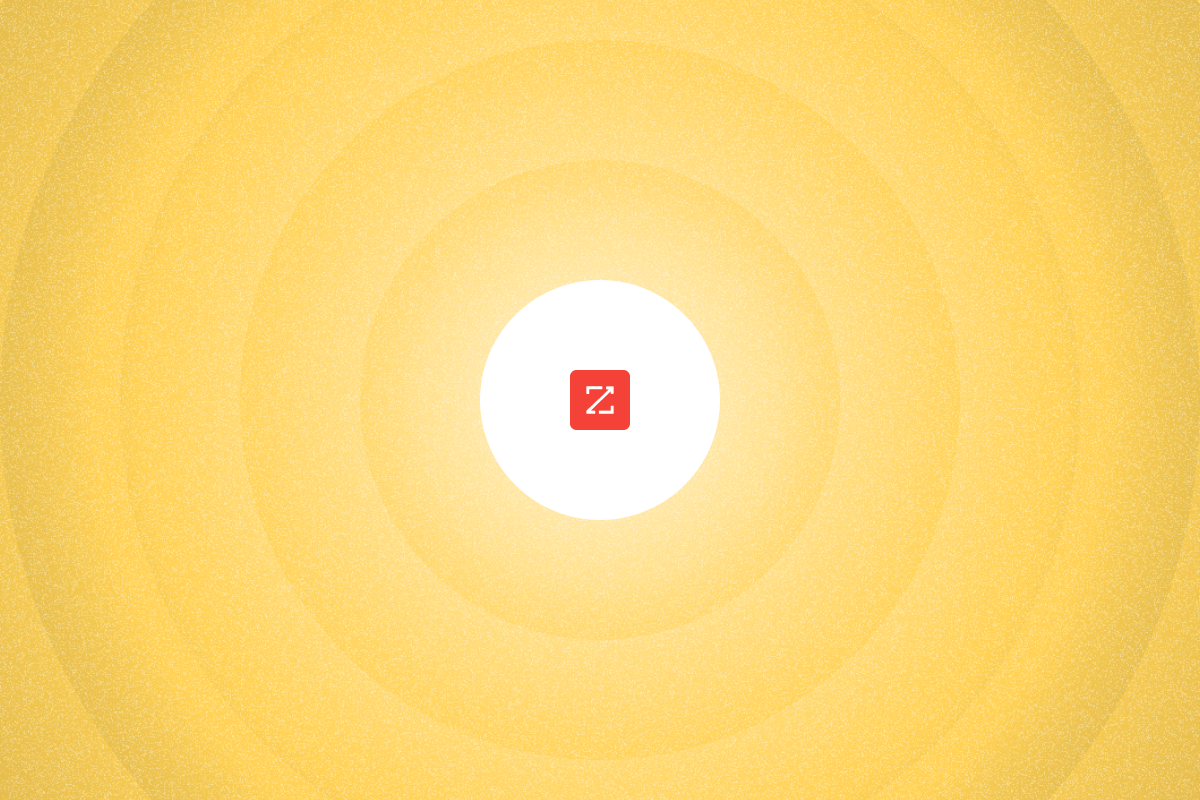If ZoomInfo doesn’t meet your needs, there are plenty of strong alternatives worth considering to enhance your lead generation efforts.
From tools tailored to specific features to options with more flexible pricing, this list highlights the best choices for 2025.
AI highlights
| Tool | Key Features | Best For | Free Trial/Plan? | Starting price (USD) |
| PhantomBuster | Automated data extraction and outreach | Automated lead generation | ✅ | $56/month |
| LinkedIn Sales Navigator | Advanced lead search and real-time updates | Social selling and prospecting | ❌ | $99/month |
| Cognism | Verified contact data and buyer intent signals | GDPR-compliant global outreach | ❌ | $15,100/year |
| Lusha | Quick and verified contact retrieval | Quick LinkedIn prospecting | ✅ | $37/month |
| Clearbit | Real-time data enrichment and API integration | Data enrichment and integration | ❌ | Custom pricing |
| UpLead | Verified leads and real-time email verification | SMBs needing reliable leads | ✅ | $99/month |
| RocketReach | Comprehensive contact profiles | Accurate lead contact details | ✅ | $48/month |
| Lead411 | Accurate and updated contact information | SMBs and verified leads | ✅ | $75/month |
| Kaspr | Real-time data verification | GDPR-focused European data | ✅ | $49/month |
| LeadIQ | AI-driven outreach and tracking | AI-powered prospecting | ✅ | Custom pricing |
| 6sense | Predictive analytics and ABM features | ABM strategies and intent data | ❌ | Six figures annually |
| Hunter.io | Email lookup and verification | Email-focused teams | ✅ | $49/month |
| Apollo.io | Sales engagement with a vast database | Sales teams needing outreach tools | ✅ | $59/month |
| Seamless.ai | AI-powered lead generation | Budget-friendly lead generation | ✅ | $147/month |
1. PhantomBuster
PhantomBuster is a powerful automation tool that elevates your lead generation and prospecting efforts.
It helps marketing and sales teams easily collect, enrich, and score leads by automating data extraction and outreach on platforms like LinkedIn.
Key features
- Generate leads using intent data to focus on the right prospects.
- Extract contact details directly from platforms like LinkedIn.
- Automate outreach efforts with email sequences and LinkedIn messaging.
- AI-powered lead scoring and qualification to prioritize your hottest sales opportunities.
- Seamlessly integrate with your CRM to streamline workflows.
PhantomBuster vs. ZoomInfo
When choosing between PhantomBuster and ZoomInfo, there are a few pieces of information you should consider:
| PhantomBuster | ZoomInfo | |
| Data Source | Scrapes fresh data from public platforms like LinkedIn. | Provides a static database with extensive pre-verified contact information. |
| Data Quality | Dynamic and customizable, but it depends on the sources scraped. | High-quality, verified contact details but can occasionally be outdated. |
| Data Extraction Speed | Fast and adaptable, extracting only what’s needed. | Instant access to its large pre-built database. |
| Data Privacy Compliance | GDPR-friendly. | Compliant with major data regulations but relies on bulk data collection. |
| Automation Features | Advanced automation for lead generation and outreach workflows. | Limited automation features compared to PhantomBuster. |
| Customization | Highly customizable to suit specific workflows and data needs. | Pre-defined workflows with limited flexibility. |
| Ease of Use | User-friendly with a small learning curve for advanced features. | Straightforward and easy to use, especially for database searches. |
| Integrations | Seamless integration with CRMs and other tools to enable workflows. | Integrates well with CRMs but lacks PhantomBuster’s automation flexibility. |
| Pricing | Budget-friendly, especially for small to mid-sized teams. | Costly, as its premium pricing is mainly suitable for enterprises. |
The main differences are:
- Data source: PhantomBuster scrapes real-time data from platforms like LinkedIn, keeping your leads fresh and accurate. ZoomInfo relies on a static database, which may not always reflect the latest updates.
- Automation: With tools like the AI LinkedIn Profile Enricher and the LinkedIn Outreach, PhantomBuster automates outreach workflows to save you time. ZoomInfo’s automation is limited to list management and filtering.
- Flexibility: PhantomBuster lets you create custom workflows tailored to your needs, from prospecting to engagement. ZoomInfo’s pre-set options don’t offer the same adaptability.
- Pricing: PhantomBuster’s pricing is more budget-friendly, starting at $56/month, making it ideal for small and medium-sized teams. ZoomInfo’s pricing caters more to large enterprises.
If you’re looking for dynamic data and hands-on automation, PhantomBuster offers a flexible, cost-effective alternative.
Pricing
PhantomBuster offers a 14-day free trial and three pricing plans: Start ($56/month), Grow ($128/month), and Scale ($352/month), all of which include automation, AI credits, and community access.
2. LinkedIn Sales Navigator
LinkedIn Sales Navigator is a premium tool designed to help sales teams connect with prospects on LinkedIn.
It provides advanced search filters, lead recommendations, and detailed insights to support outreach and LinkedIn prospecting.
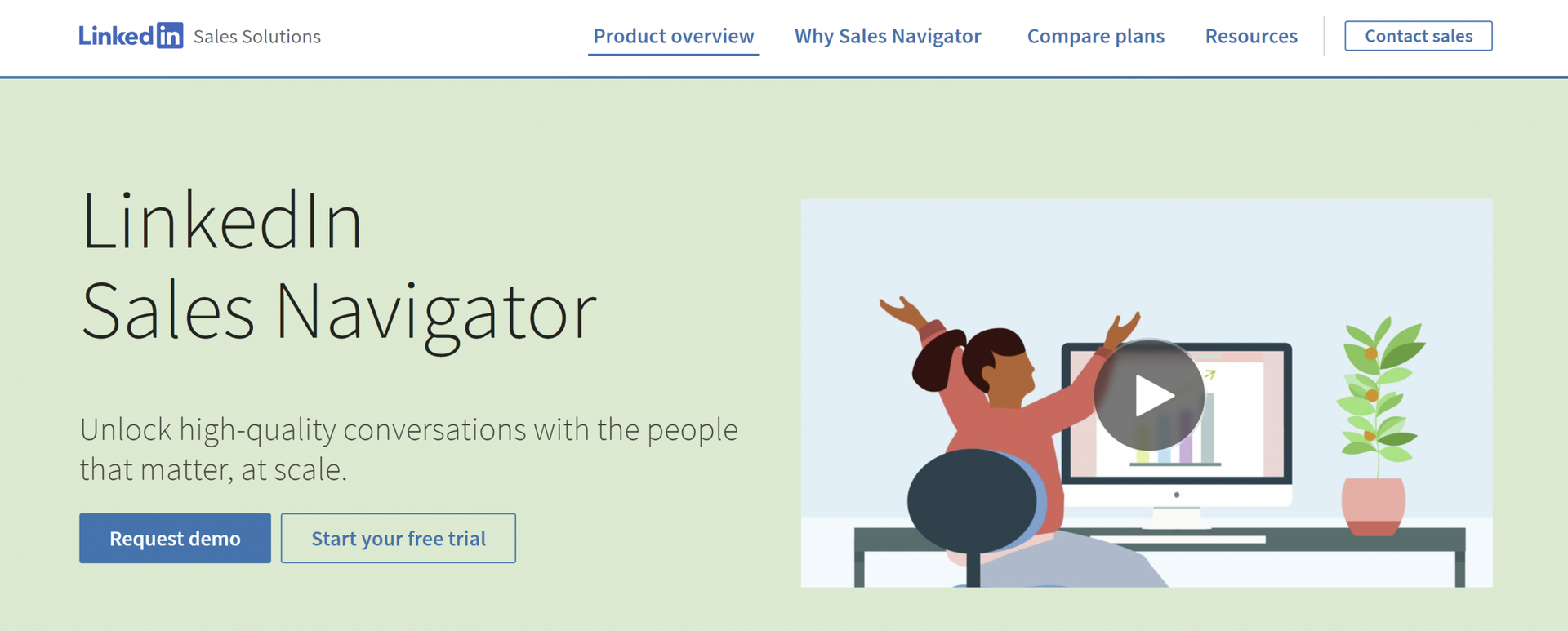
Key features
- Advanced lead and account search filters to find ideal prospects.
- Real-time updates on leads and companies for smarter outreach.
- CRM integration to sync lead data and streamline workflows.
- Saved lead recommendations to build and nurture your pipeline efficiently.
LinkedIn Sales Navigator vs. ZoomInfo
Here’s a summary of the main differences:
- Data source: LinkedIn Sales Navigator pulls data directly from LinkedIn profiles, while ZoomInfo uses a pre-built B2B contact database.
- Data updates: Sales Navigator offers real-time updates from LinkedIn activity, whereas ZoomInfo relies on periodic database refreshes.
- Automation: ZoomInfo includes basic automation for managing contact lists, while Sales Navigator focuses on social selling tools.
- Customization: Sales Navigator provides tailored searches for LinkedIn users, while ZoomInfo supports broader database filtering.
- Pricing: LinkedIn Sales Navigator starts at $99/month, making it more accessible than ZoomInfo’s premium enterprise pricing.
Pricing
LinkedIn Sales Navigator starts at $99/month for individual plans, with custom pricing available for teams based on their specific needs.
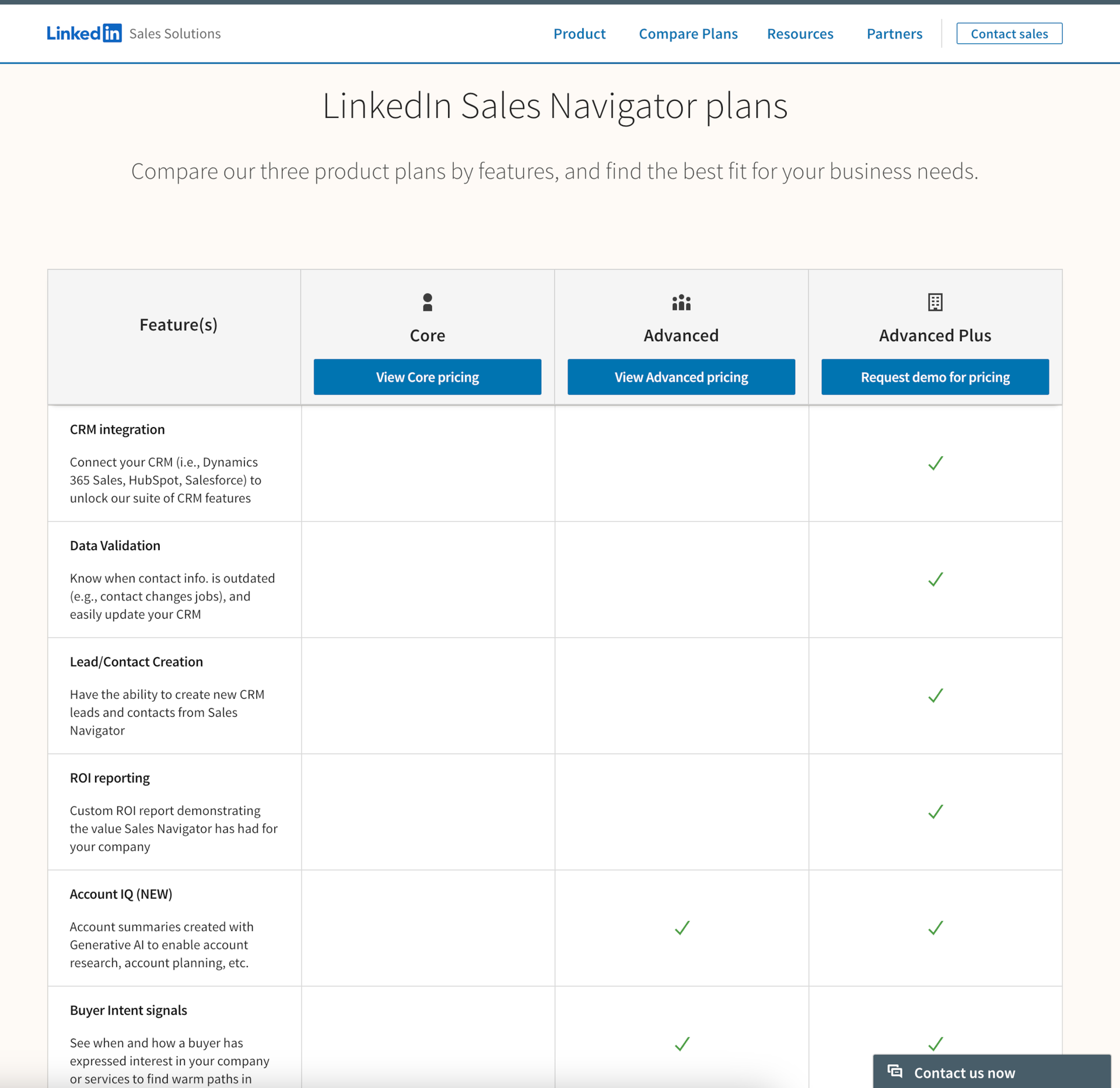
3. Cognism
Cognism is a sales intelligence platform specializing in GDPR-compliant B2B contact data.
Known for its verified phone numbers and advanced data enrichment, it’s ideal for businesses targeting global and regional markets while prioritizing compliance and accuracy.
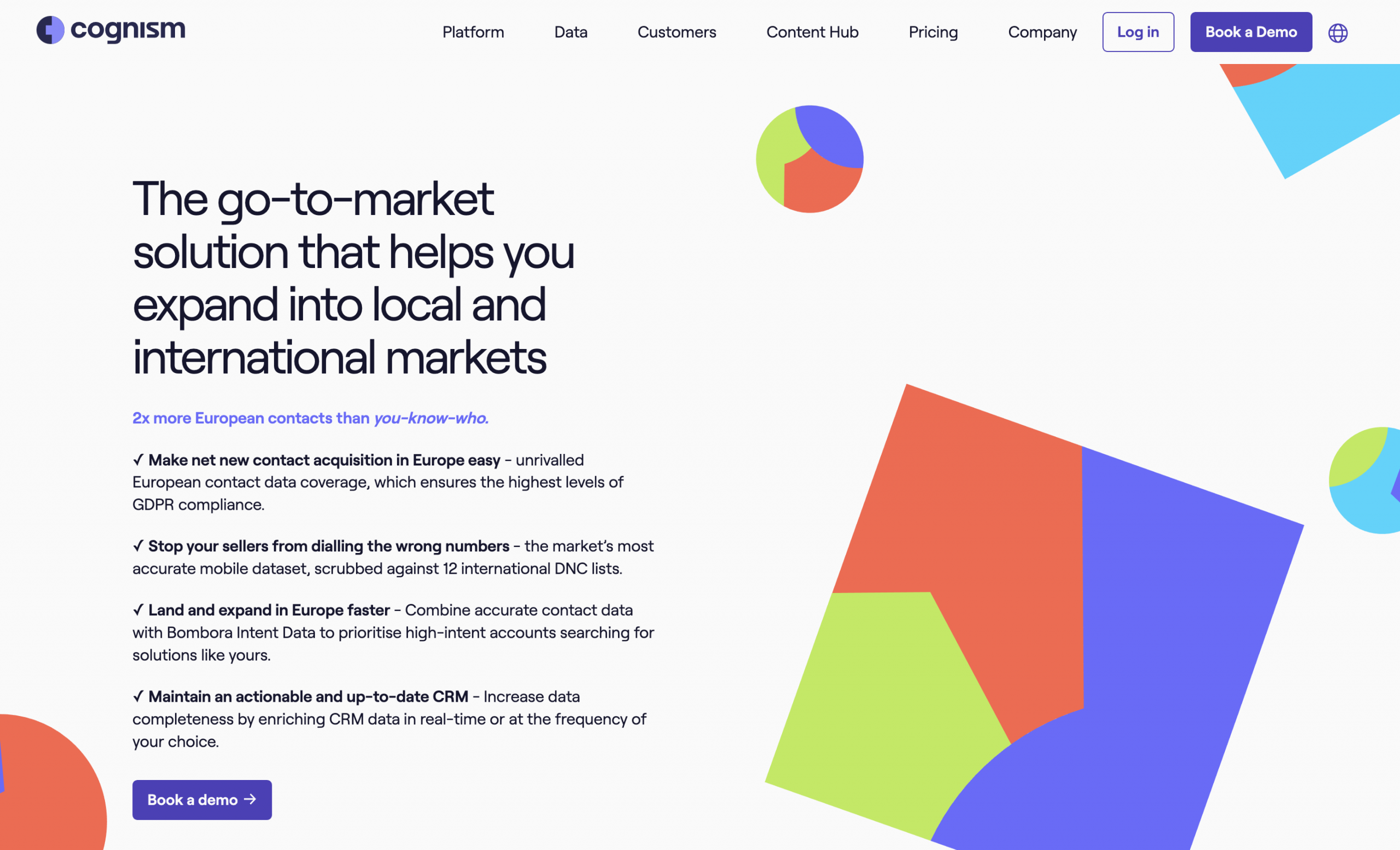
Key features
- Accurate, up-to-date global contact database, including verified mobile numbers.
- Intent data provider included (Bombora) for smarter lead prioritization.
- CRM and sales engagement integrations for seamless workflows.
- Advanced enrichment tools for detailed prospect insights.
- Ethical data processing with full compliance with GDPR and CCPA regulations.
Cognism vs. ZoomInfo
Here’s how the two platforms compare:
- Data accuracy: Verified mobile numbers and buyer intent data set Cognism apart, while ZoomInfo emphasizes broader B2B profiles.
- Compliance: With extensive DNC checks, Cognism offers full GDPR and CCPA compliance, whereas ZoomInfo takes a more large-scale data collection approach.
- Features: Advanced enrichment tools and intent data make Cognism ideal for targeted outreach, while ZoomInfo focuses on providing a comprehensive database.
- Pricing: Tailored team pricing makes Cognism flexible, but ZoomInfo’s enterprise plans often come at a higher cost.
Pricing
Cognism offers tailored pricing to fit your needs, typically starting at $15,100 per year. Additional features like verified mobile numbers and intent data range from $2,550 to $25,000.
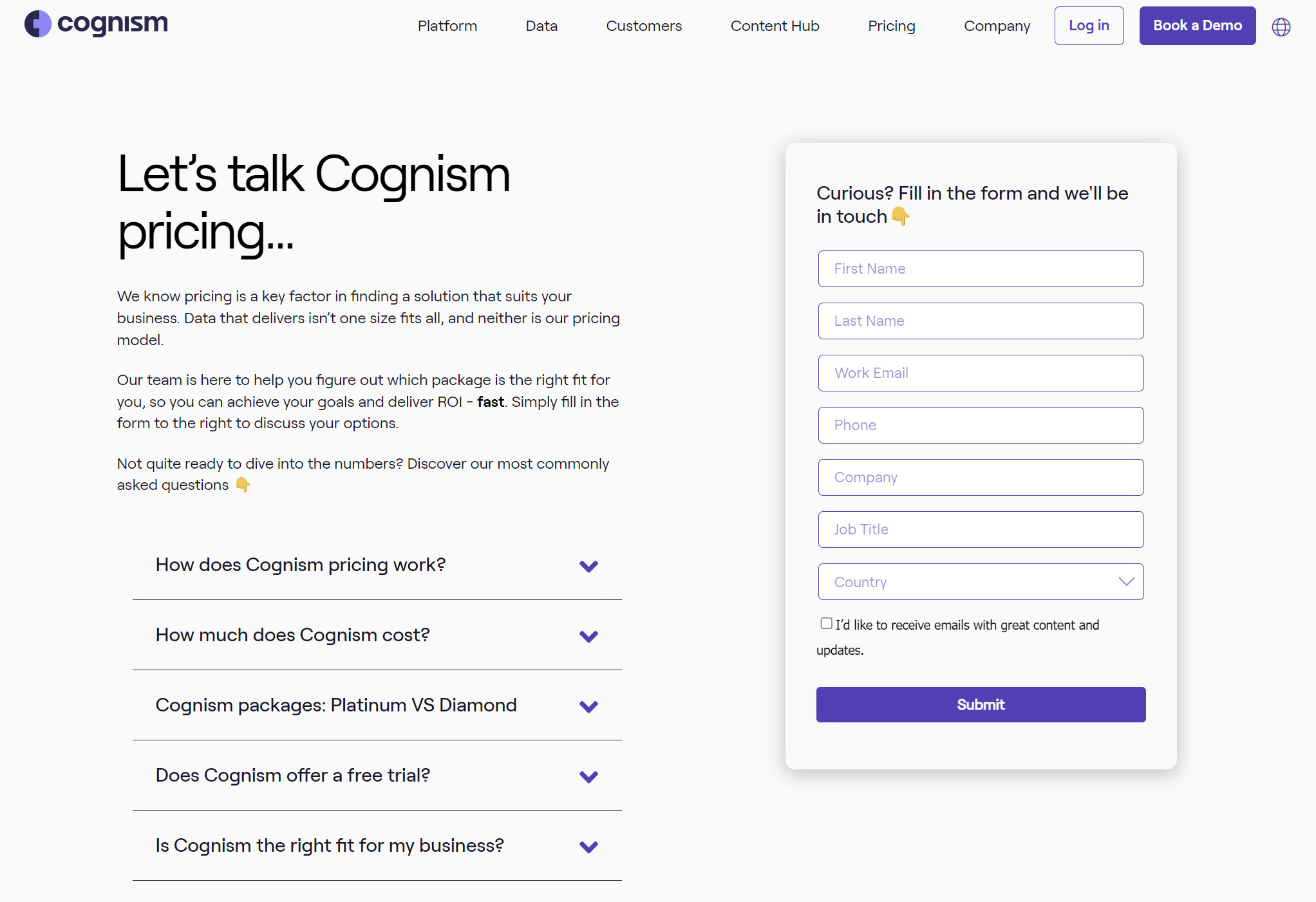
4. Lusha
Lusha is a simple yet effective tool for accessing verified contact information like direct dials and email addresses.
It’s known for its quick setup and user-friendly browser extension, making it a great option for fast, reliable sales and marketing strategies.
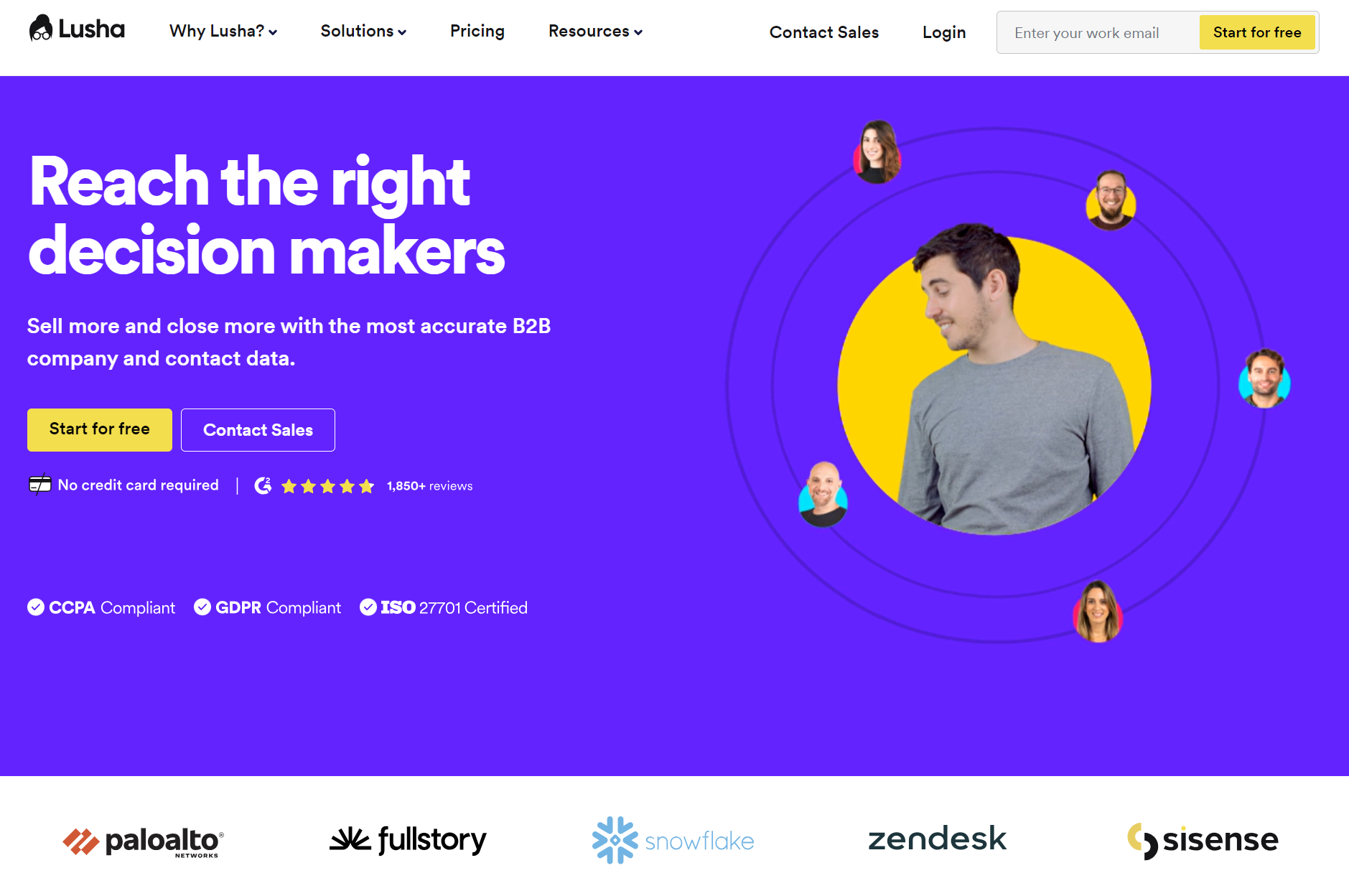
Key features
- Provides verified phone numbers and email addresses.
- Instant access to tailored prospect lists.
- Easy-to-use browser extension for quick LinkedIn contact retrieval.
- GDPR and CCPA compliance for data protection.
- Ideal for quick and efficient B2B lead generation.
Lusha vs. ZoomInfo
Here’s how Lusha compares to ZoomInfo:
- Simplicity: Lusha offers a more streamlined, user-friendly interface, while ZoomInfo is designed for enterprise use with a steeper learning curve.
- Lead retrieval: Lusha focuses on quick LinkedIn-based contact searches, whereas ZoomInfo provides a broader B2B database.
- Cost-effectiveness: Lusha’s affordable plans make it a great option for smaller teams, while ZoomInfo caters to enterprise-level budgets.
- Compliance: Both are GDPR-compliant, but Lusha emphasizes immediate, targeted contact data.
Pricing
Lusha offers a free plan, with paid options starting at $37/month per user. Premium plans include advanced features and custom pricing for large teams.
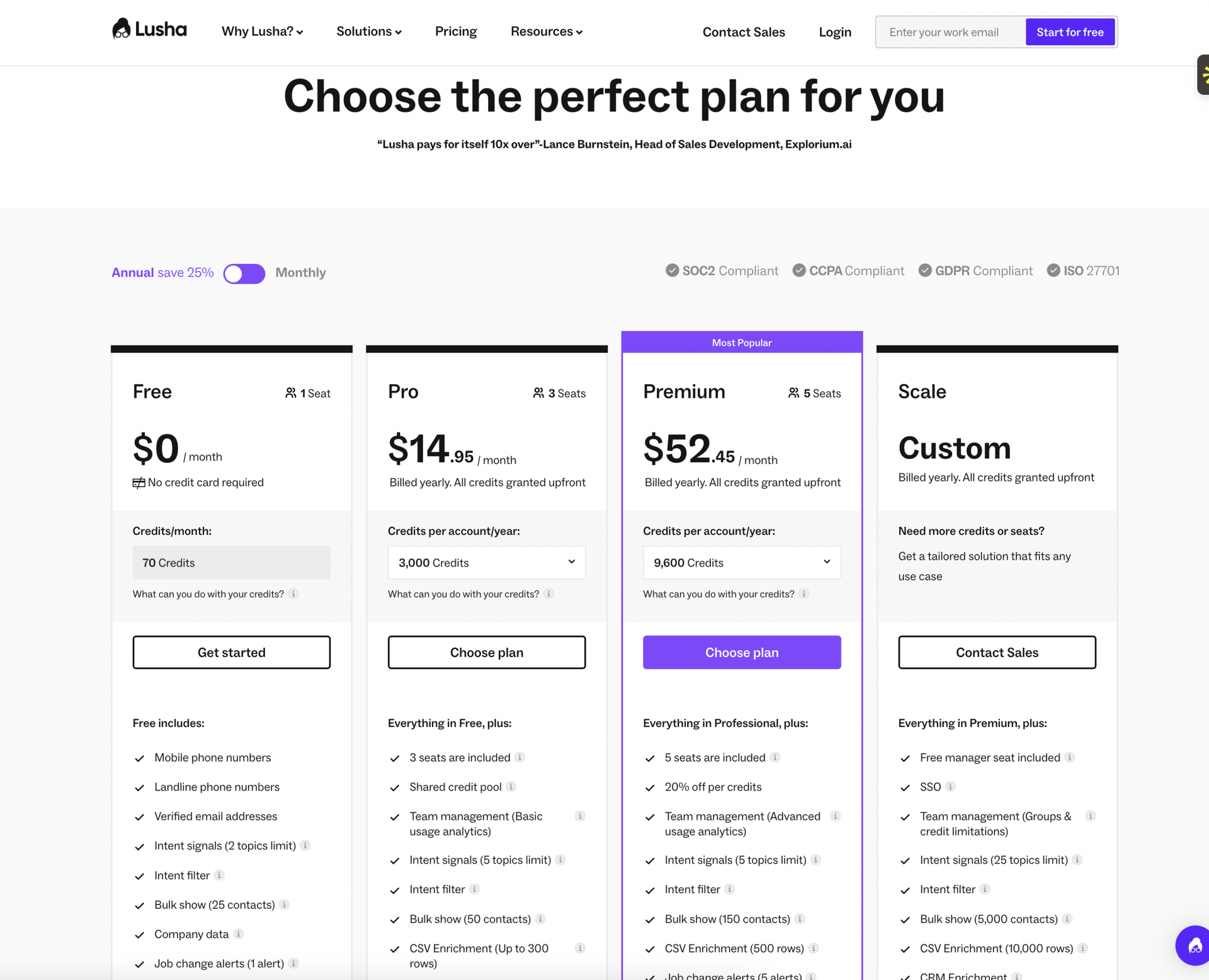
5. Clearbit
Clearbit is a data enrichment platform designed to help businesses discover leads, enrich contact records, and personalize outreach in real-time.
It’s widely known for its seamless integrations and advanced API access, making it a powerful tool for marketing and sales teams.
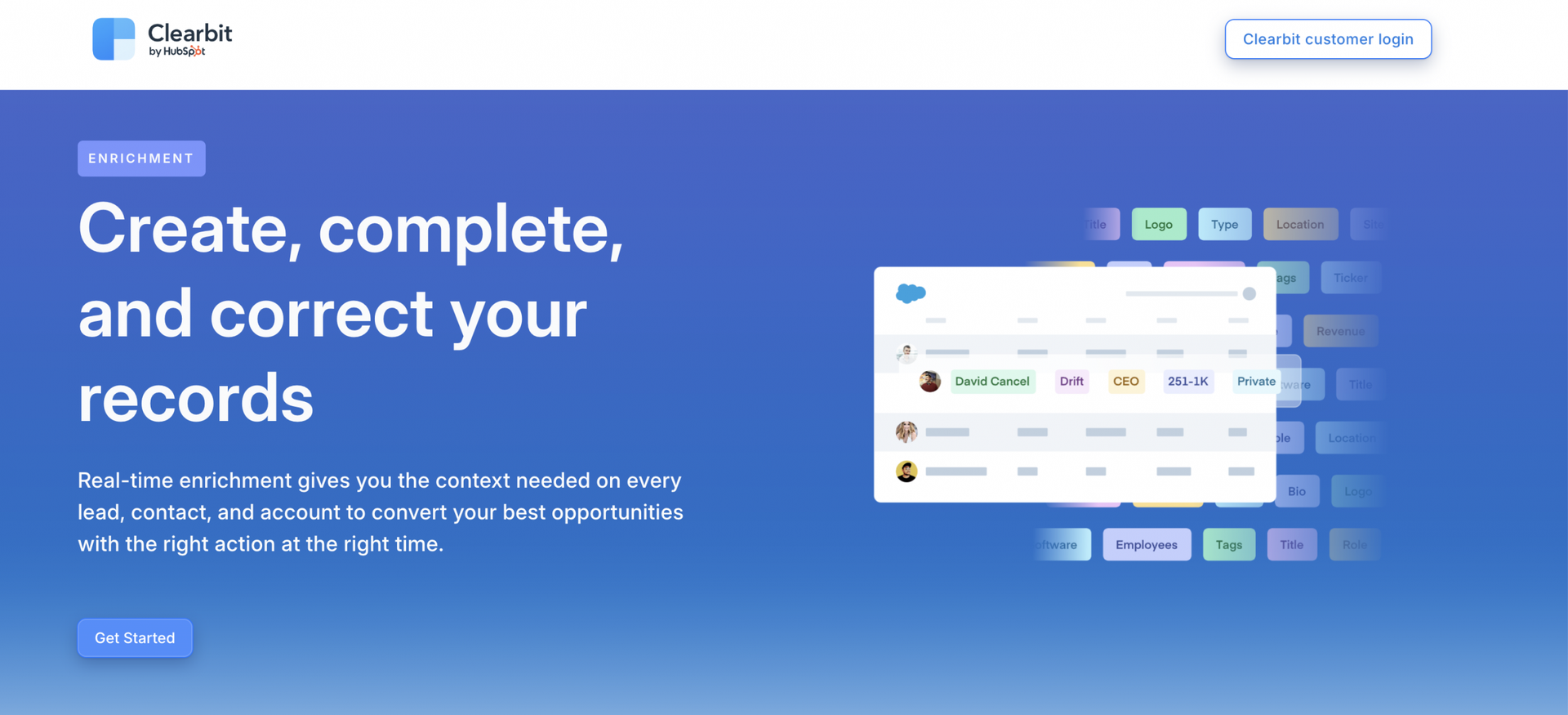
Key features
- Real-time data enrichment to keep contact records up-to-date.
- Clearbit Reveal identifies anonymous website visitors for better-targeted lead generation.
- Powerful API access for integration with CRMs like Salesforce.
- Contact lookup for precise filtering by job roles, industries, and more.
Clearbit vs. ZoomInfo
Here’s how Clearbit compares to ZoomInfo:
- Targeting focus: Clearbit prioritizes data enrichment and visitor identification, while ZoomInfo offers a more expansive B2B lead database.
- Integrations: Clearbit excels with API access and CRM compatibility, while ZoomInfo provides a broader tool ecosystem.
- Database size: ZoomInfo has a larger contact database, but Clearbit focuses on accuracy and real-time updates.
- Use case: Clearbit is ideal for targeted, smaller-scale campaigns; ZoomInfo suits enterprise-level prospecting.
Pricing
Clearbit’s pricing depends on your specific needs and is available upon request. While no exact costs are listed, users often note its flexible options for scaling data enrichment and API usage.
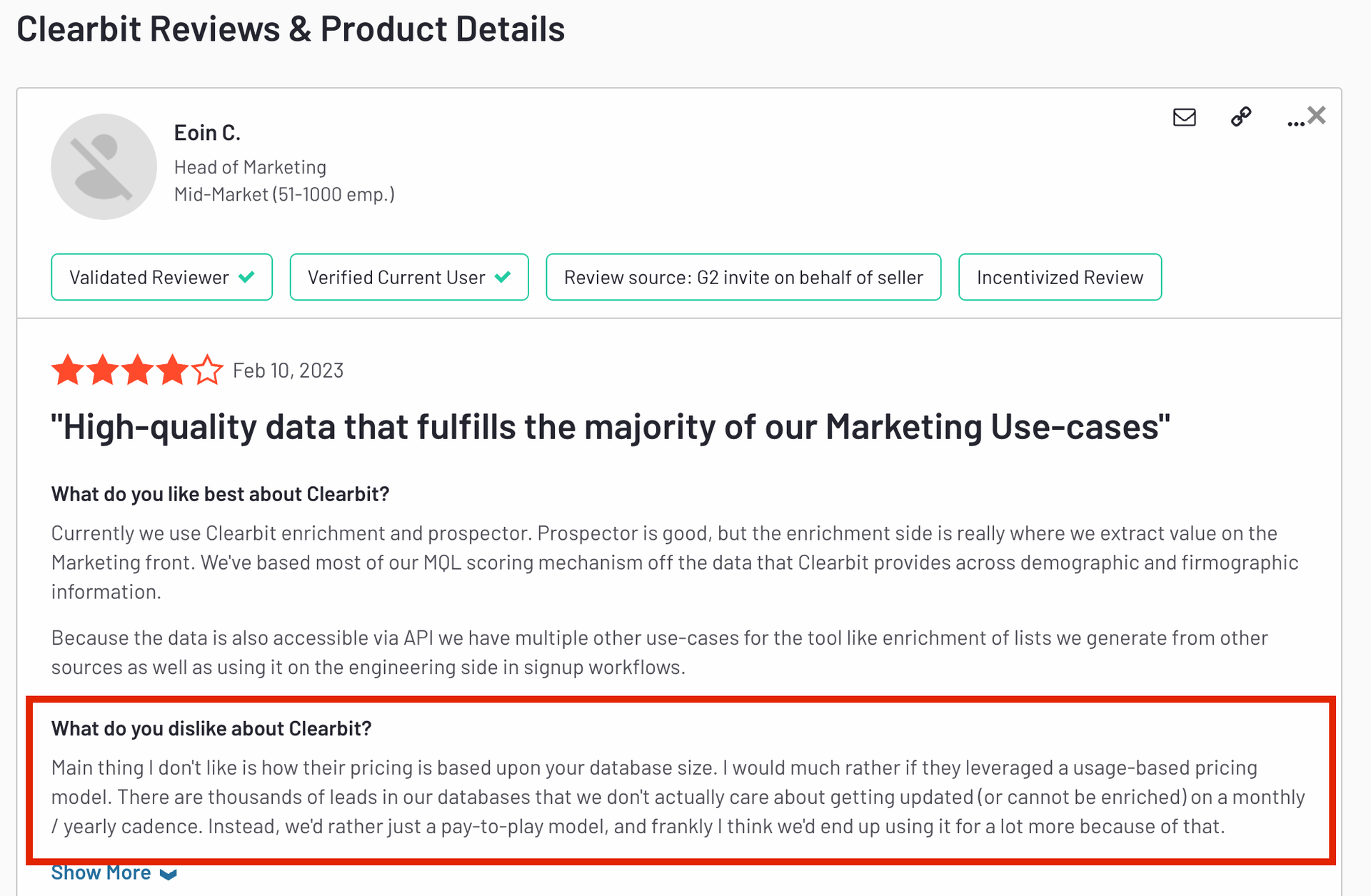
6. UpLead
UpLead is a trusted B2B lead generation platform designed to help marketing and sales teams connect with verified leads.
It provides access to a high-quality database of contacts enriched with real-time data.
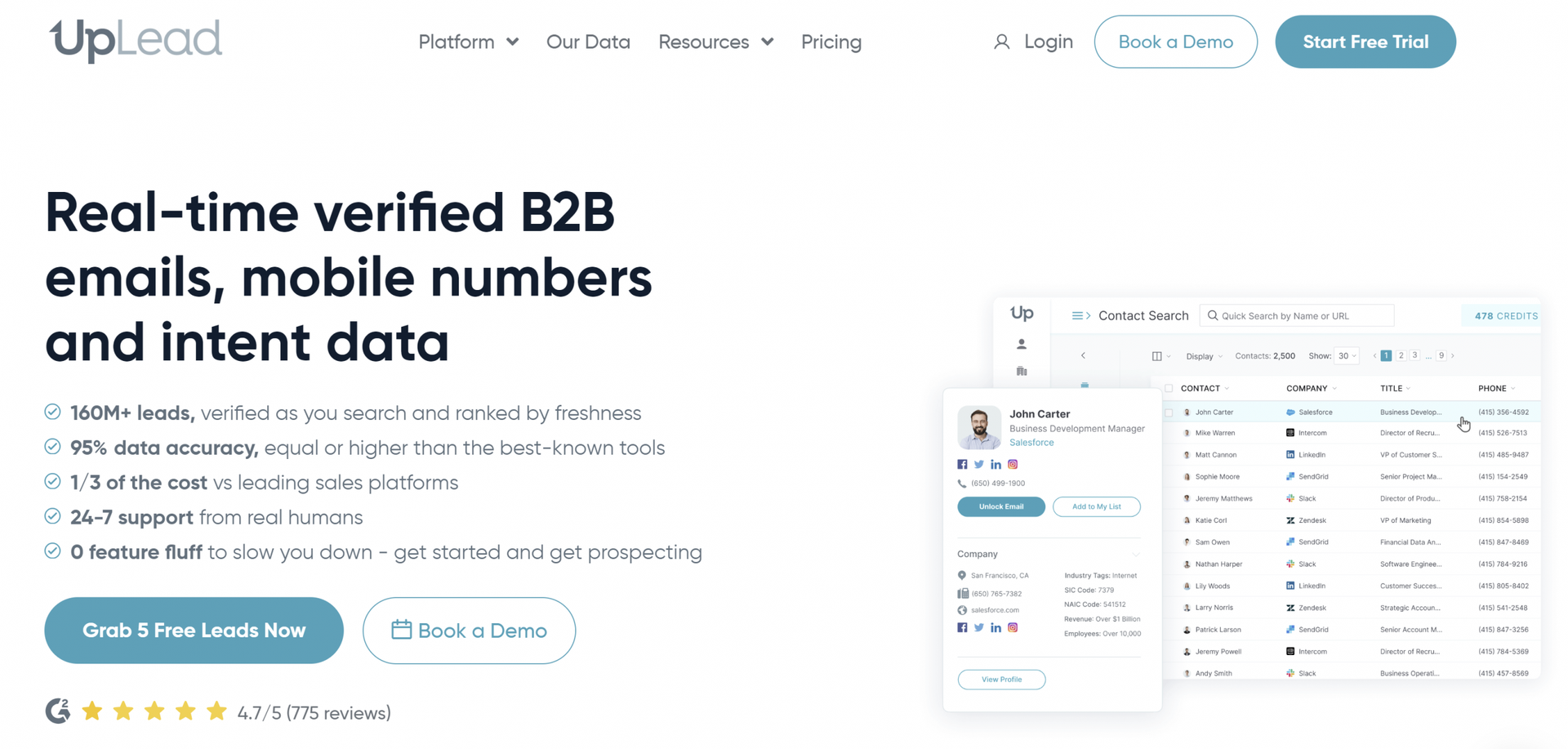
Key features
- Lead generation with intent data for precise targeting.
- Real-time email verification for accurate contact data.
- Advanced search filters with over 50 criteria for qualified lead lists.
- Chrome extension for easy contact data extraction from LinkedIn and company websites.
- CRM integrations with Salesforce, HubSpot, and Zoho for seamless workflows.
- Data enrichment tools to enhance lead profiles with firmographics and technographics.
UpLead vs. ZoomInfo
Here’s how they compare:
- Database size: UpLead offers 135 million verified contacts; ZoomInfo has a larger database.
- Ease of use: UpLead has a more user-friendly interface with transparent pricing.
- Pricing: UpLead provides monthly plans; ZoomInfo requires long-term contracts.
- Features: ZoomInfo includes advanced automation and intent tracking, ideal for enterprise users.
- Target audience: UpLead suits SMBs; ZoomInfo is better for large-scale operations.
Pricing
UpLead pricing starts at $99 monthly for 170 credits, with flexible plans to suit different team sizes. Users can explore its features with a free 7-day trial.
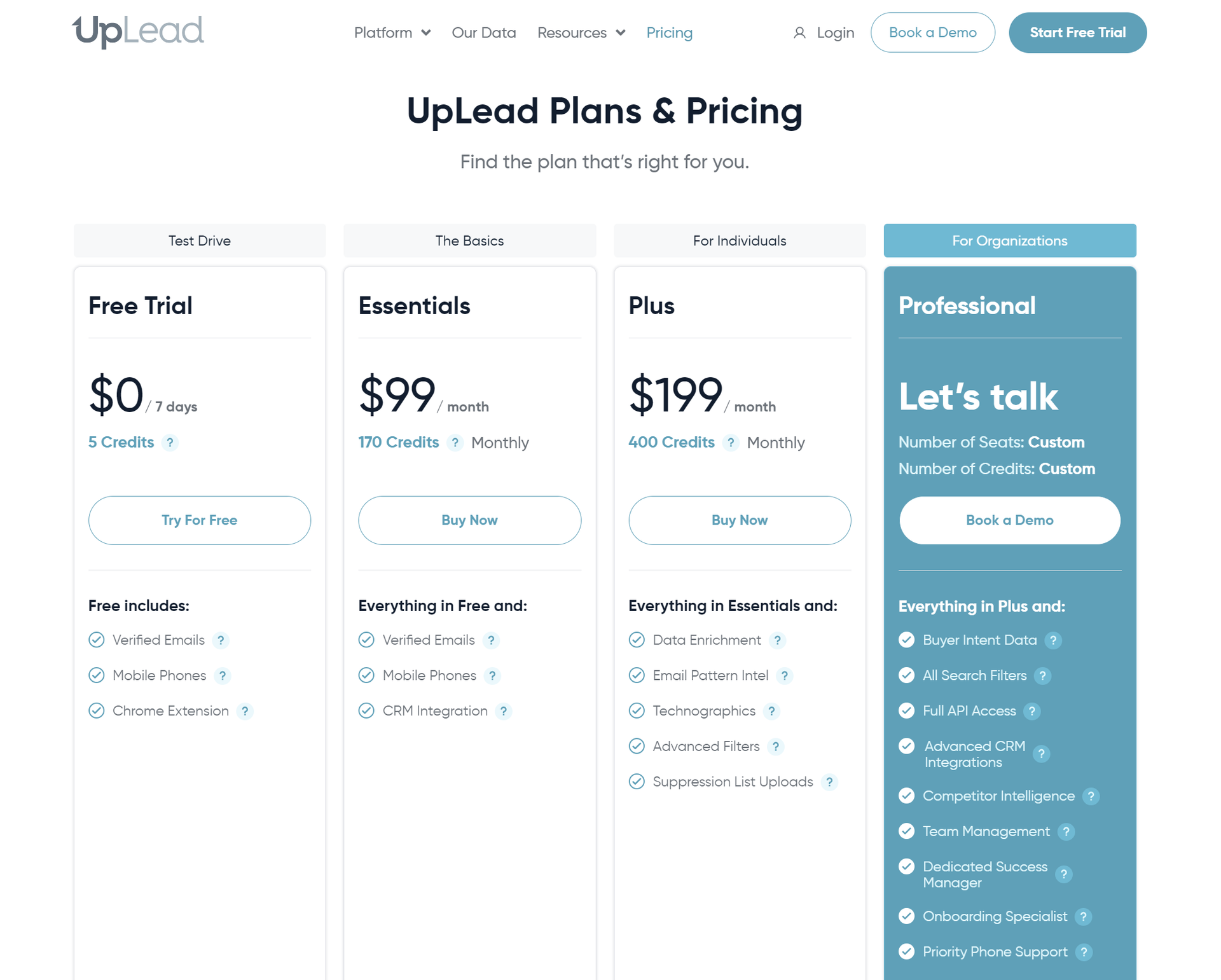
7. RocketReach
RocketReach provides comprehensive contact information for professionals, focusing on verified personal and professional emails and phone numbers.
It’s a powerful alternative to ZoomInfo for businesses aiming for accurate lead data at scale.
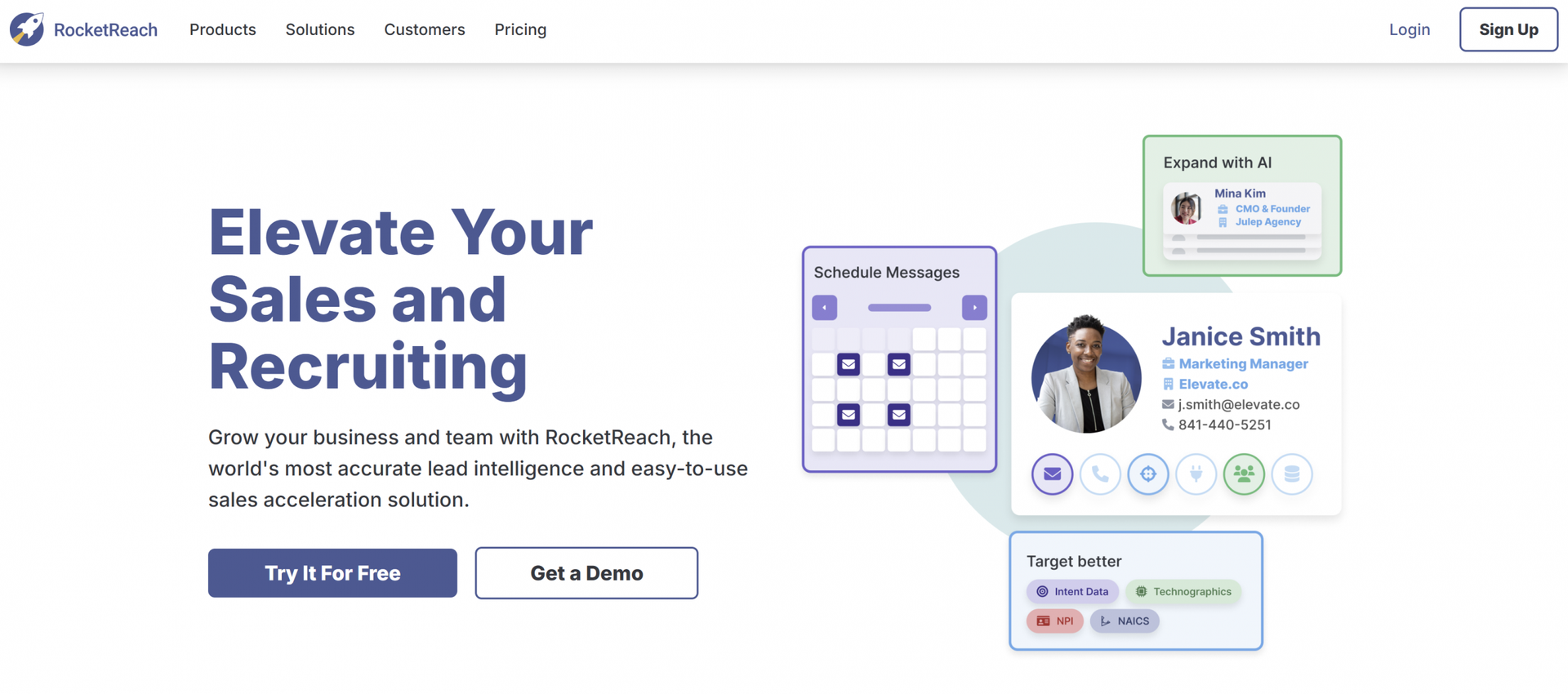
Key features
- Access to 700M+ professional profiles and 60M+ company records.
- Verified email and phone number lookups in real-time.
- AI-powered search prompts to refine lead targeting.
- Integration with popular CRM tools like Salesforce, HubSpot, and Pipedrive.
- Chrome extension for seamless contact access from websites and LinkedIn.
- Bulk lookups for efficient lead list building.
RocketReach vs. ZoomInfo
Here’s a summary of the main differences:
- Database size: RocketReach excels at offering direct contact details but has fewer company records than ZoomInfo, which has an expansive B2B focus.
- Use case: RocketReach is ideal for individual sales practitioners and recruiters, while ZoomInfo better supports enterprise-level account-based marketing.
- Pricing: RocketReach is generally more affordable, catering to startups and SMBs, while ZoomInfo targets larger businesses.
Pricing
RocketReach offers a free plan with limited features and lookup credits, while its paid plans start at $48/month for individuals and $83/month per user for teams, making it a more affordable option compared to ZoomInfo’s enterprise-level pricing.
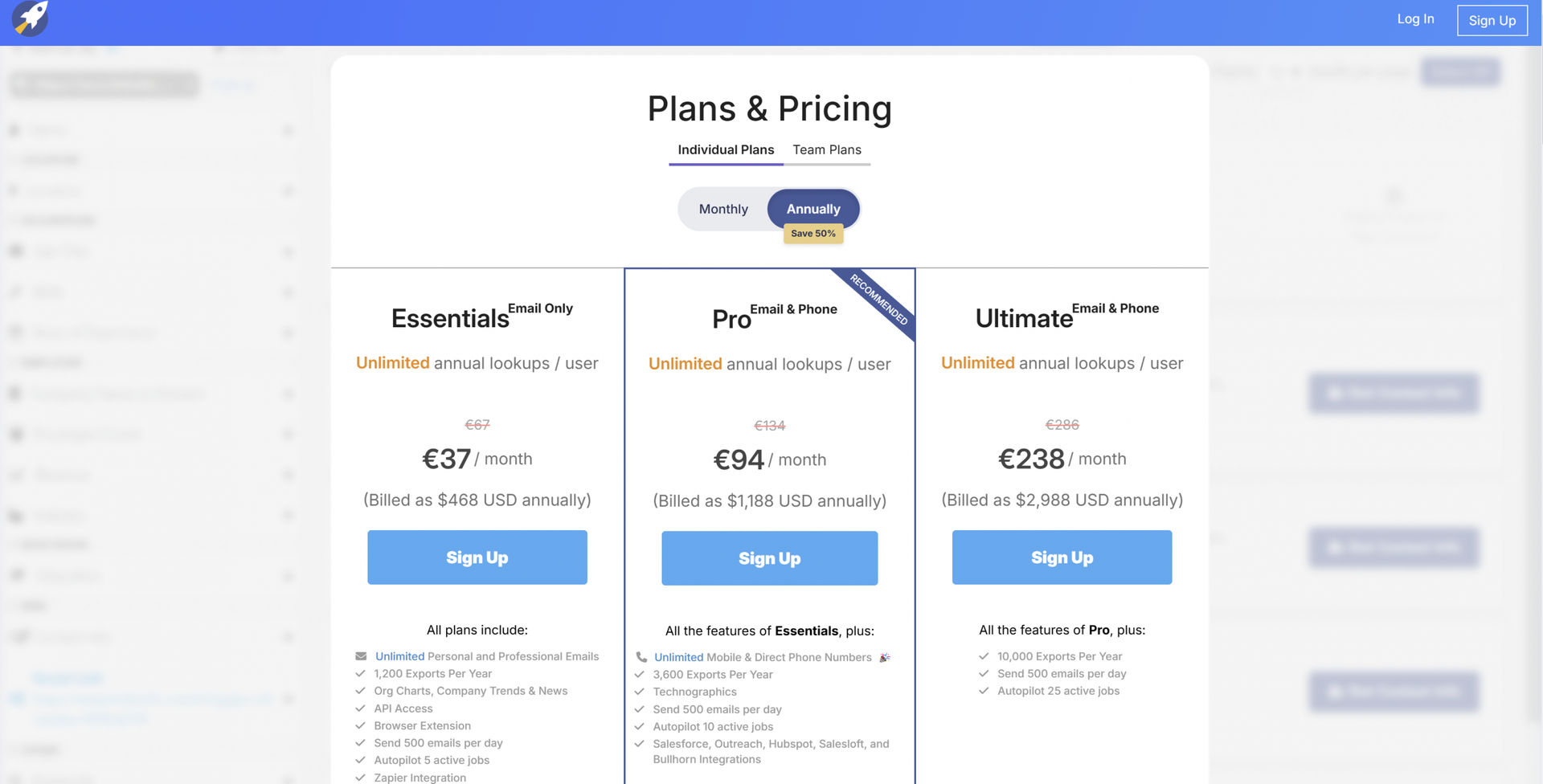
8. Lead411
Lead411 is a B2B data platform that delivers accurate contact information and actionable insights for sales and marketing teams.
Its emphasis on data verification and ethical practices sets it apart, ensuring businesses can rely on its database for effective lead generation and outreach.
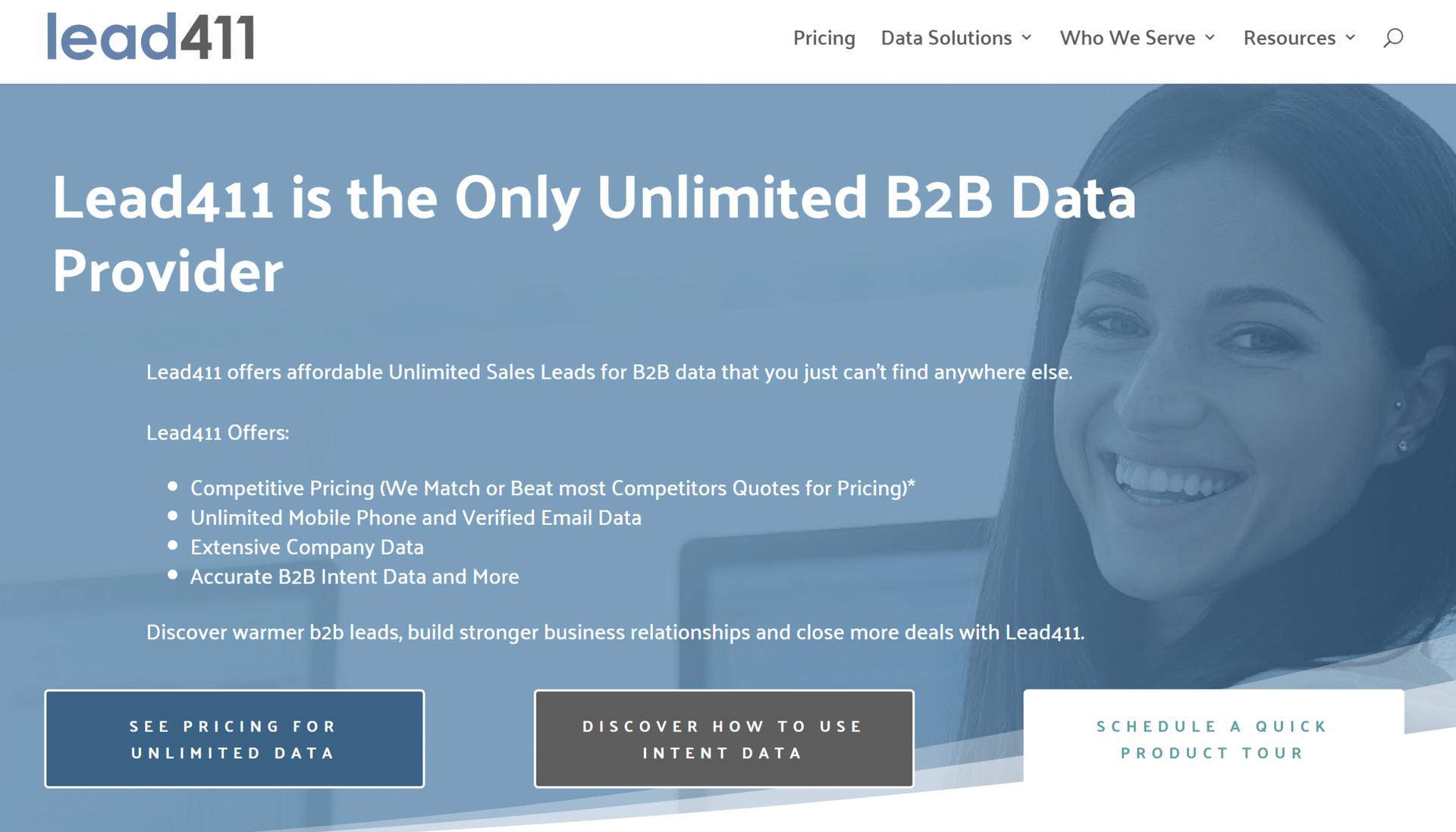
Key features
- Access to 450M+ verified contacts and 20M+ company records with a 96% accuracy rate.
- Growth B2B buying signals that track hiring trends, funding rounds, and tech adoption.
- Advanced search filters to refine leads by job title, industry, and location.
- Seamless CRM integrations with platforms like Salesforce, HubSpot, and Microsoft Dynamics.
- Regular data updates every 90 days to guarantee fresh, reliable information.
Lead411 vs. ZoomInfo
Here’s how Lead411 compares to ZoomInfo:
- Database size: While smaller, Lead411’s database is highly curated and verified.
- Use case: Lead411 suits SMBs and teams seeking precision, while ZoomInfo is ideal for enterprises requiring broader coverage.
- Pricing: Lead411 is more budget-friendly for smaller teams, with plans starting at $75/month.
Pricing
Lead411 is priced accessibly, starting at $75/month for unlimited data access, making it an excellent choice for smaller businesses.
For larger teams, enterprise plans are available starting at $5,000/year. These plans offer advanced features and dedicated support.
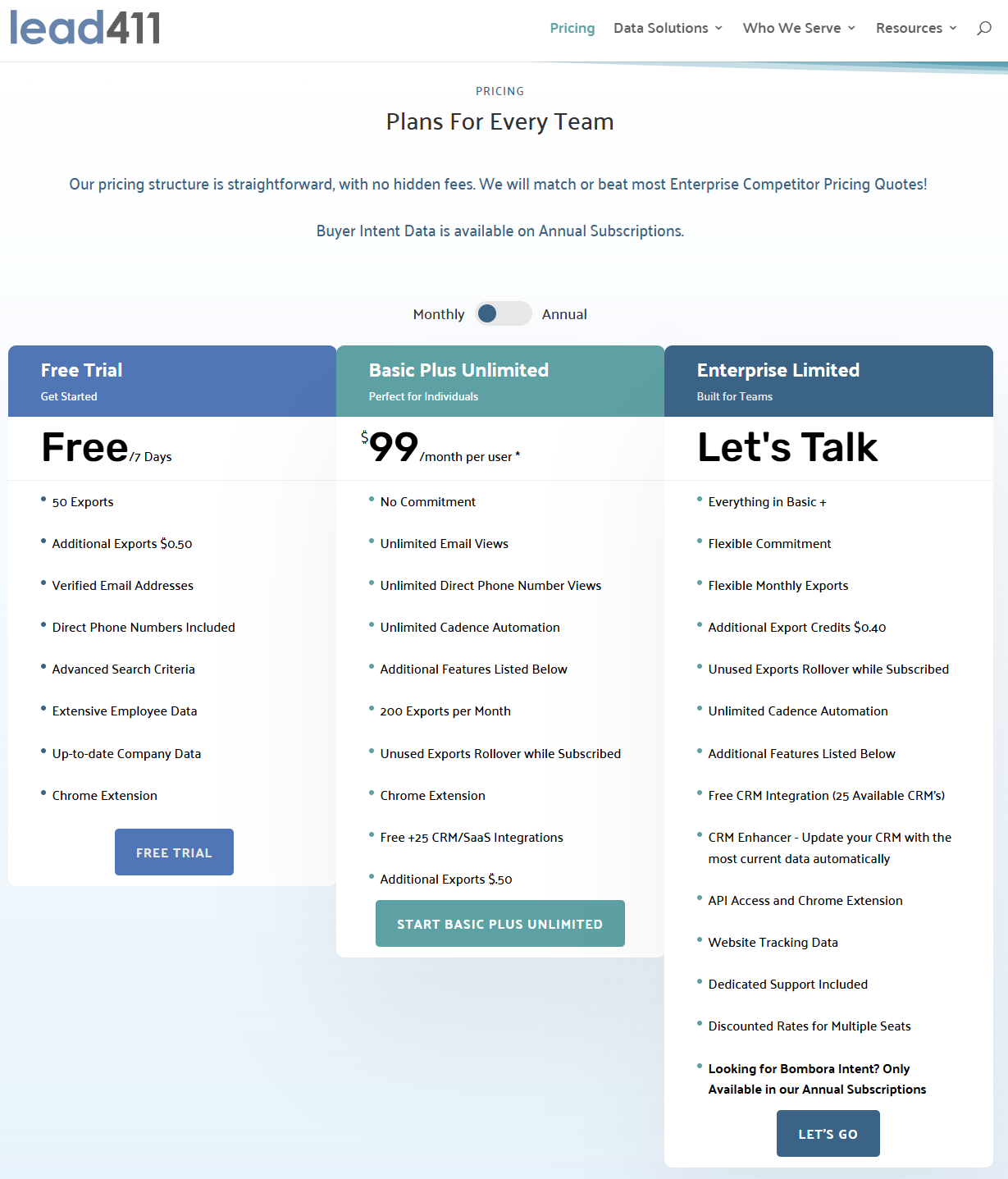
9. Kaspr
Kaspr simplifies lead generation by focusing on real-time data verification and seamlessly integrating with your existing sales productivity tools.
It’s a great option for businesses prioritizing GDPR compliance and high-quality European data.
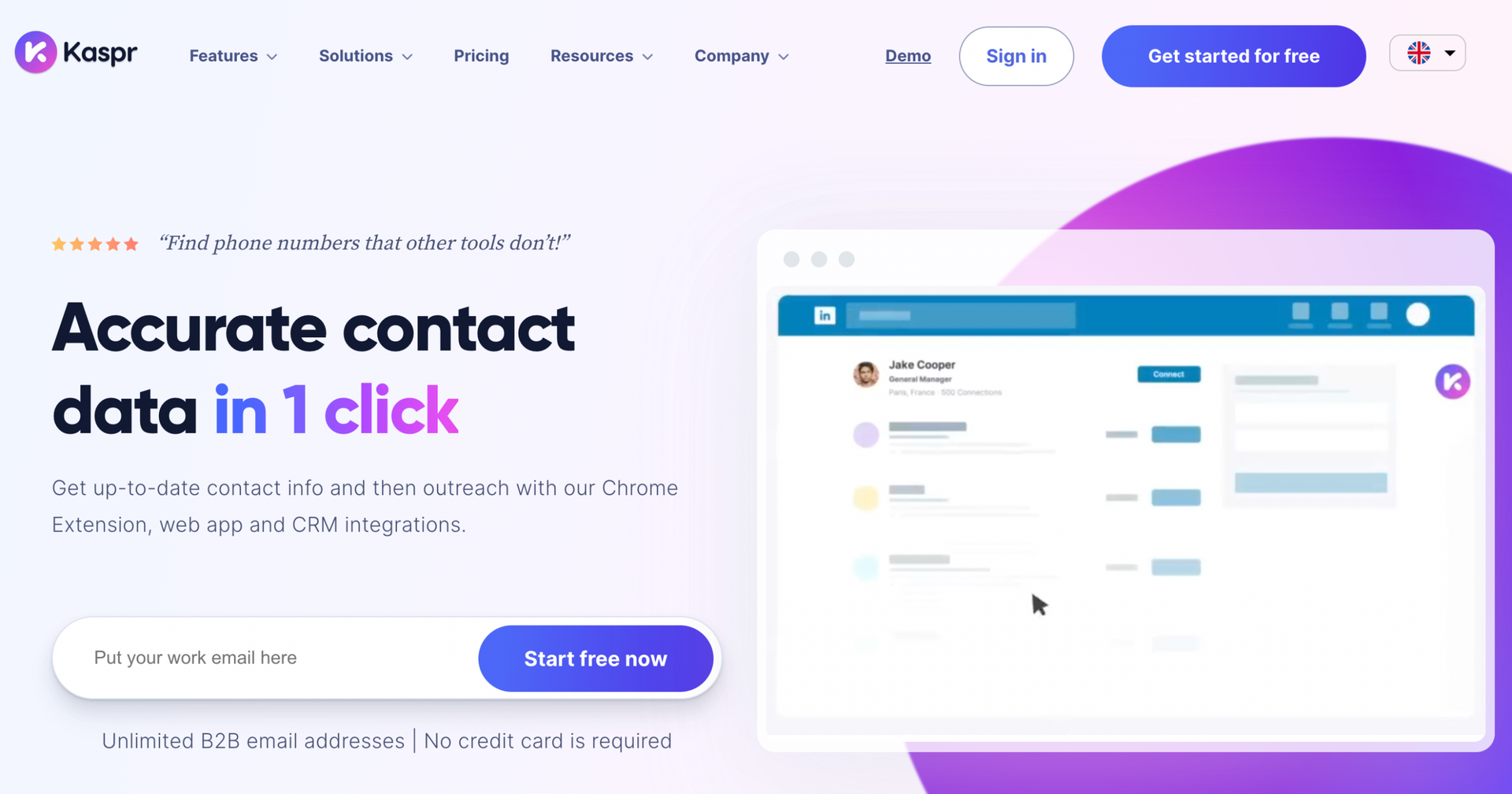
Key features
- Provides access to over 500M+ verified contacts and 120M+ European company records for targeted lead generation.
- Offers real-time data verification against 150+ sources to guarantee accuracy.
- Includes a Chrome extension for seamless LinkedIn prospecting and data extraction.
- Integrates with popular CRM platforms like Salesforce, HubSpot, and Pipedrive for enhanced workflows.
- Complies with GDPR and CCPA, making it ideal for teams focused on privacy and compliance.
Kaspr vs. ZoomInfo
Here’s how Kaspr compares to ZoomInfo:
- Regional focus: Kaspr prioritizes European markets with high-quality data, while ZoomInfo provides global coverage with a larger database.
- Data accuracy: Kaspr excels in real-time data verification for improved reliability, whereas ZoomInfo relies on expansive but less frequent updates.
- Compliance: Kaspr’s superior GDPR compliance is ideal for privacy-focused organizations, while ZoomInfo meets general compliance standards.
- Chrome extension: Kaspr offers versatile LinkedIn functionality, outperforming ZoomInfo in specific prospecting capabilities.
Pricing
Kaspr offers a free plan with basic credits, making it accessible for small businesses.
Paid plans range from $49/month to $99/month, depending on the number of credits and advanced features needed, providing flexibility for teams of all sizes.
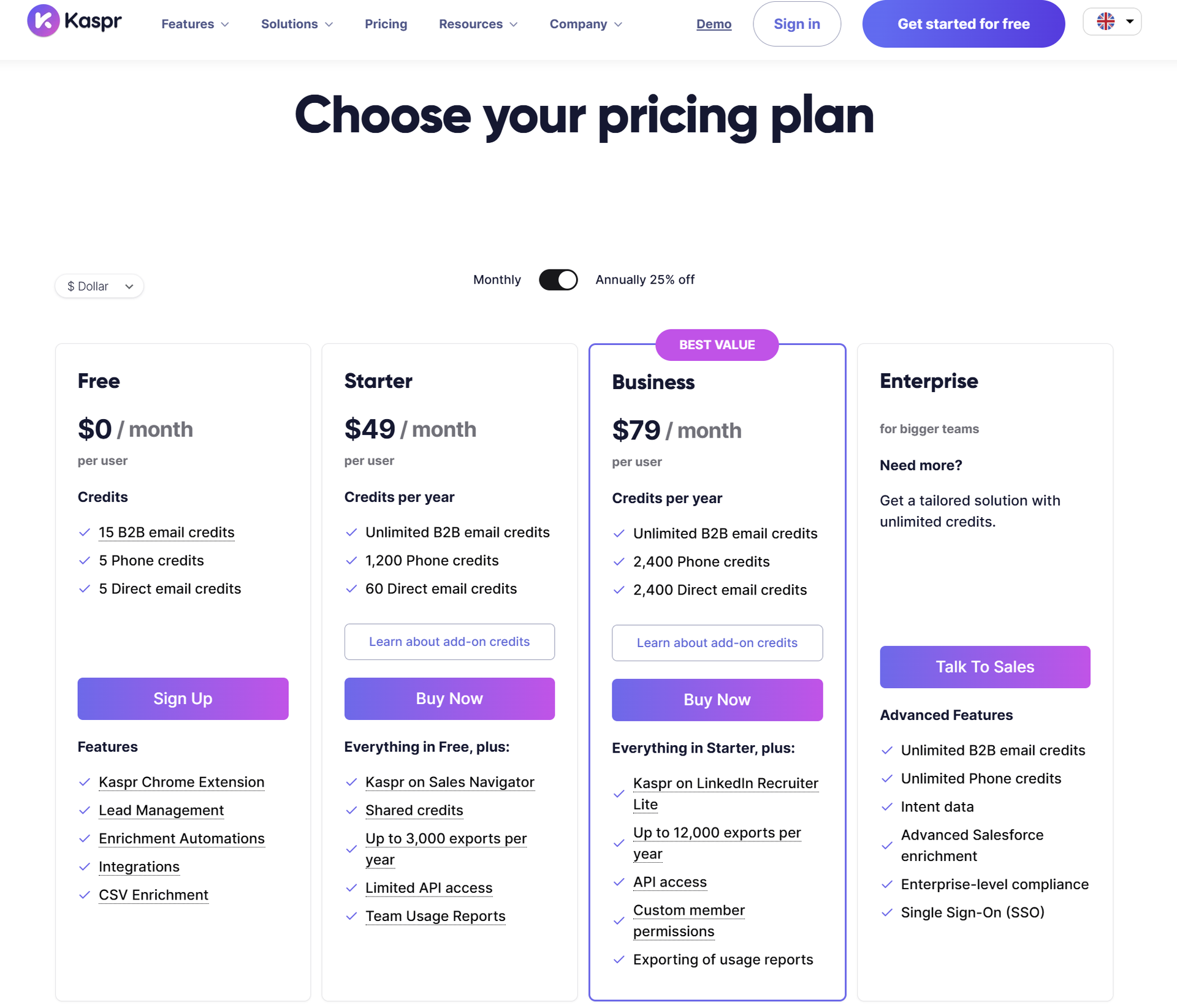
10. LeadIQ
LeadIQ simplifies prospecting by providing real-time verified data, advanced integrations, and AI-driven features that streamline outreach and engagement.
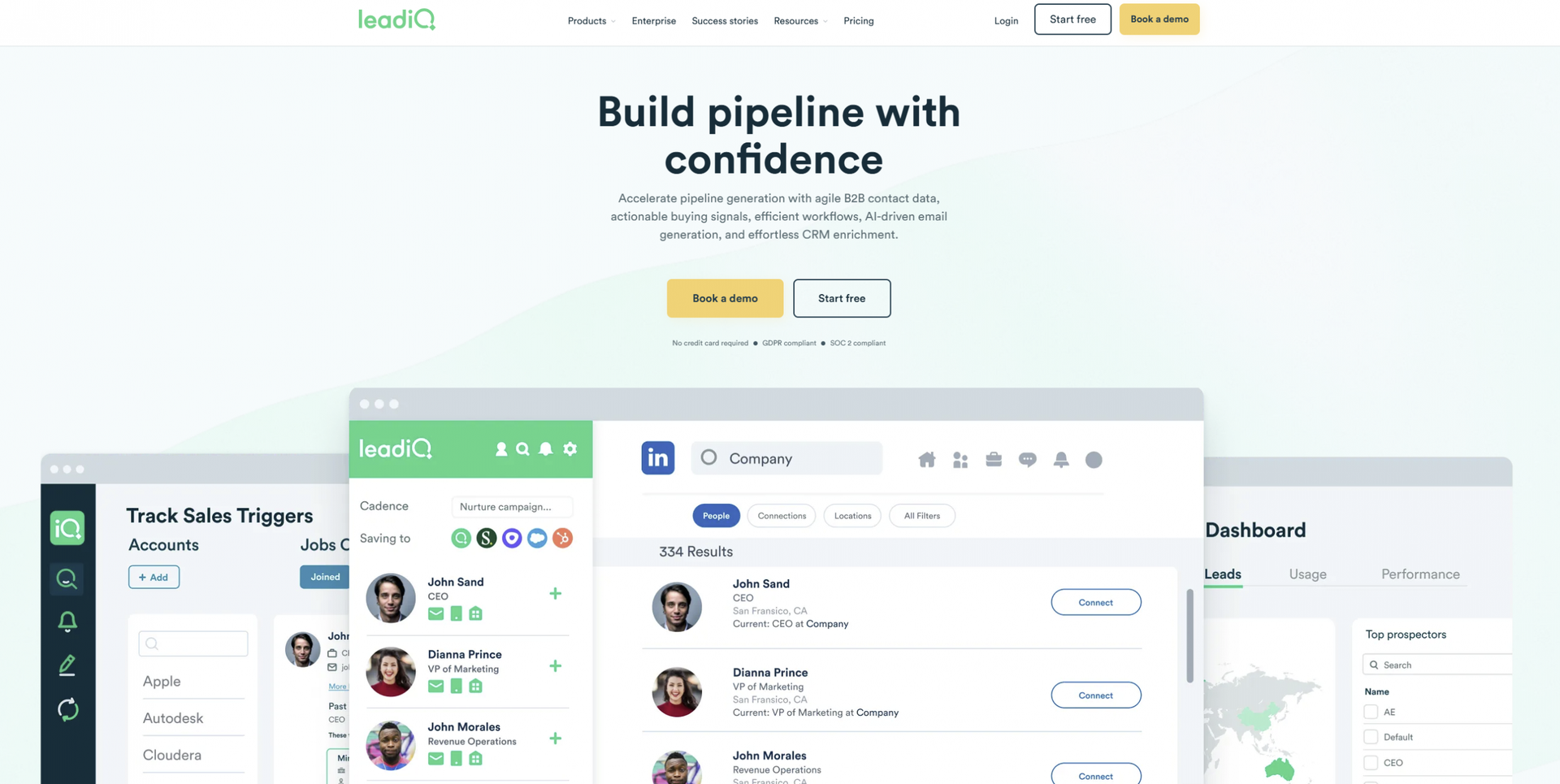
Key features
- Access real-time verified contact data to guarantee accuracy and relevance for outreach.
- Capture leads and build prospect lists directly within your CRM in one click.
- Leverage AI-driven writing recommendations to craft personalized email campaigns.
- Monitor job changes and sales triggers with advanced contact tracking features.
- Integrate seamlessly with LinkedIn and LinkedIn Sales Navigator for prospecting efficiency.
LeadIQ vs. ZoomInfo
Here’s how LeadIQ compares to ZoomInfo:
- Data freshness: LeadIQ focuses on real-time data verification to provide up-to-date contacts, while ZoomInfo updates quarterly for broader but potentially outdated coverage.
- Ease of use: LeadIQ offers a straightforward interface designed for quick adoption, while ZoomInfo provides more robust features that may require a steeper learning curve.
- Integration capabilities: LeadIQ integrates deeply with LinkedIn and Sales Navigator for seamless prospecting, while ZoomInfo supports a broader array of CRM systems.
- Pricing: LeadIQ provides affordable and transparent pricing for smaller teams.
Pricing
LeadIQ provides custom pricing based on user needs, offering scalable solutions for SMBs and growing teams. It includes a free trial to test its capabilities before committing to a plan.
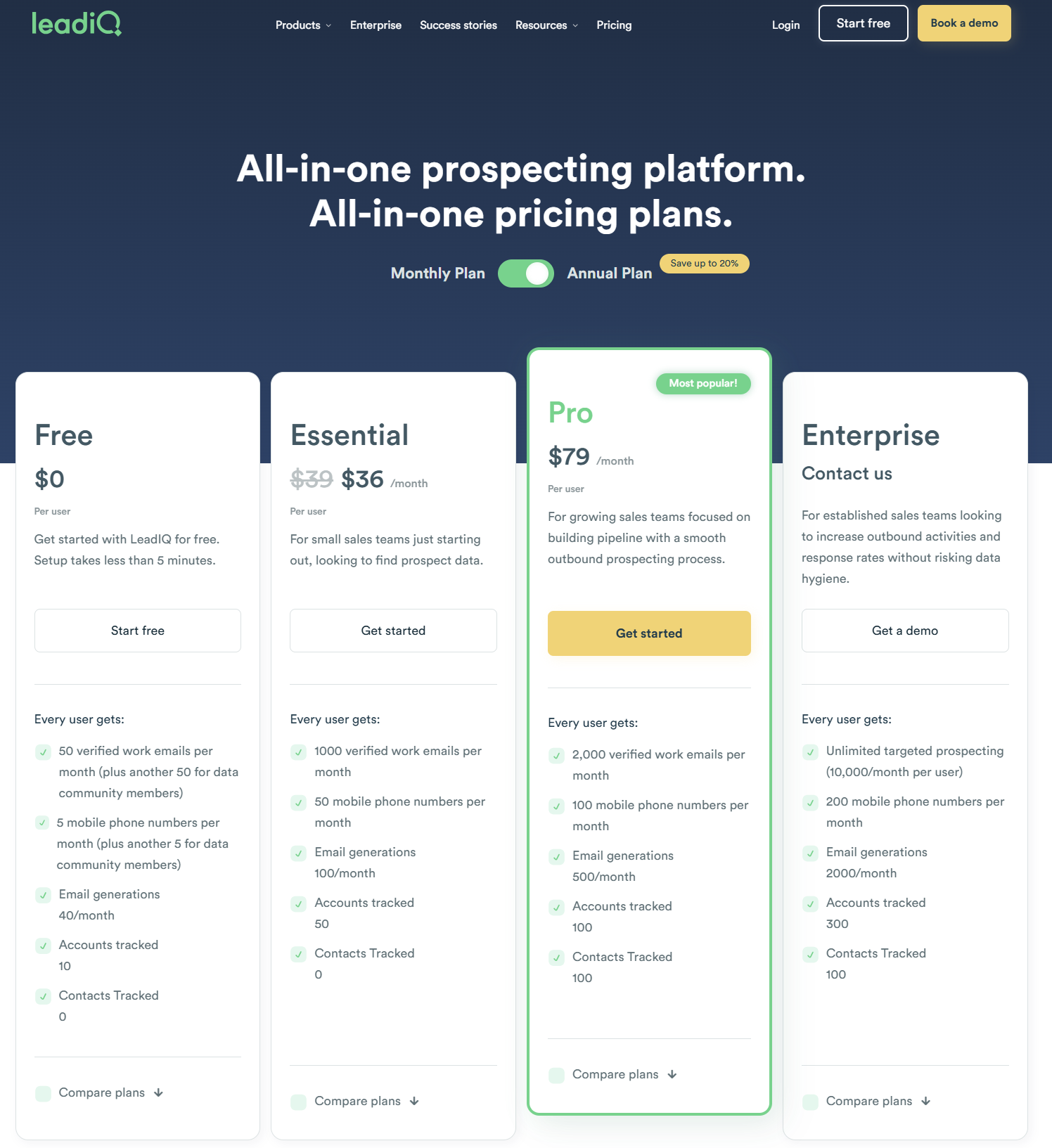
11. 6sense
6sense is an account-based orchestration platform that uses AI and big data to help businesses identify and engage high-value accounts.
Its primary focus is on predictive analytics and intent data, which enable teams to target accounts precisely at the right time.
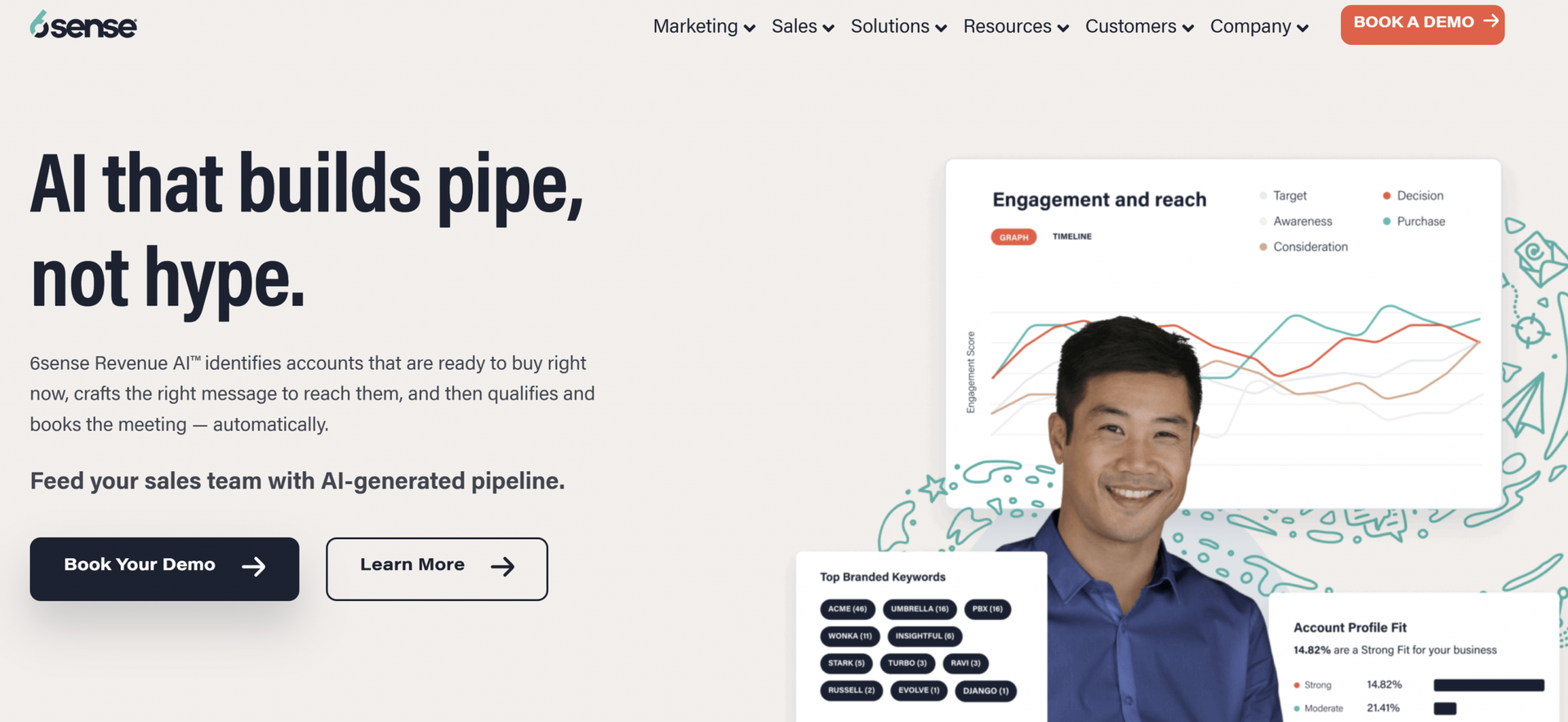
Key features
- Uses AI to forecast buyer intent and prioritize leads.
- Provides intent data to identify accounts with active buying signals.
- Integrates seamlessly with CRM and marketing automation tools.
- Supports multi-channel orchestration for personalized campaigns.
6sense vs. ZoomInfo
Here’s how 6sense stacks up against ZoomInfo:
- Use case: 6sense excels in ABM strategies with predictive analytics, while ZoomInfo is better suited for broader lead generation needs.
- Intent data: 6sense provides deeper insights with AI, whereas ZoomInfo offers more straightforward contact-level intent data.
- Integrations: Both tools integrate with major CRMs, but 6sense’s advanced orchestration sets it apart for targeted campaigns.
Pricing
Pricing for 6sense varies based on features and team size, often catering to enterprise-level organizations.
Plans typically start at six figures annually, with options for smaller teams available upon request. Interested teams should book a demo for tailored pricing.
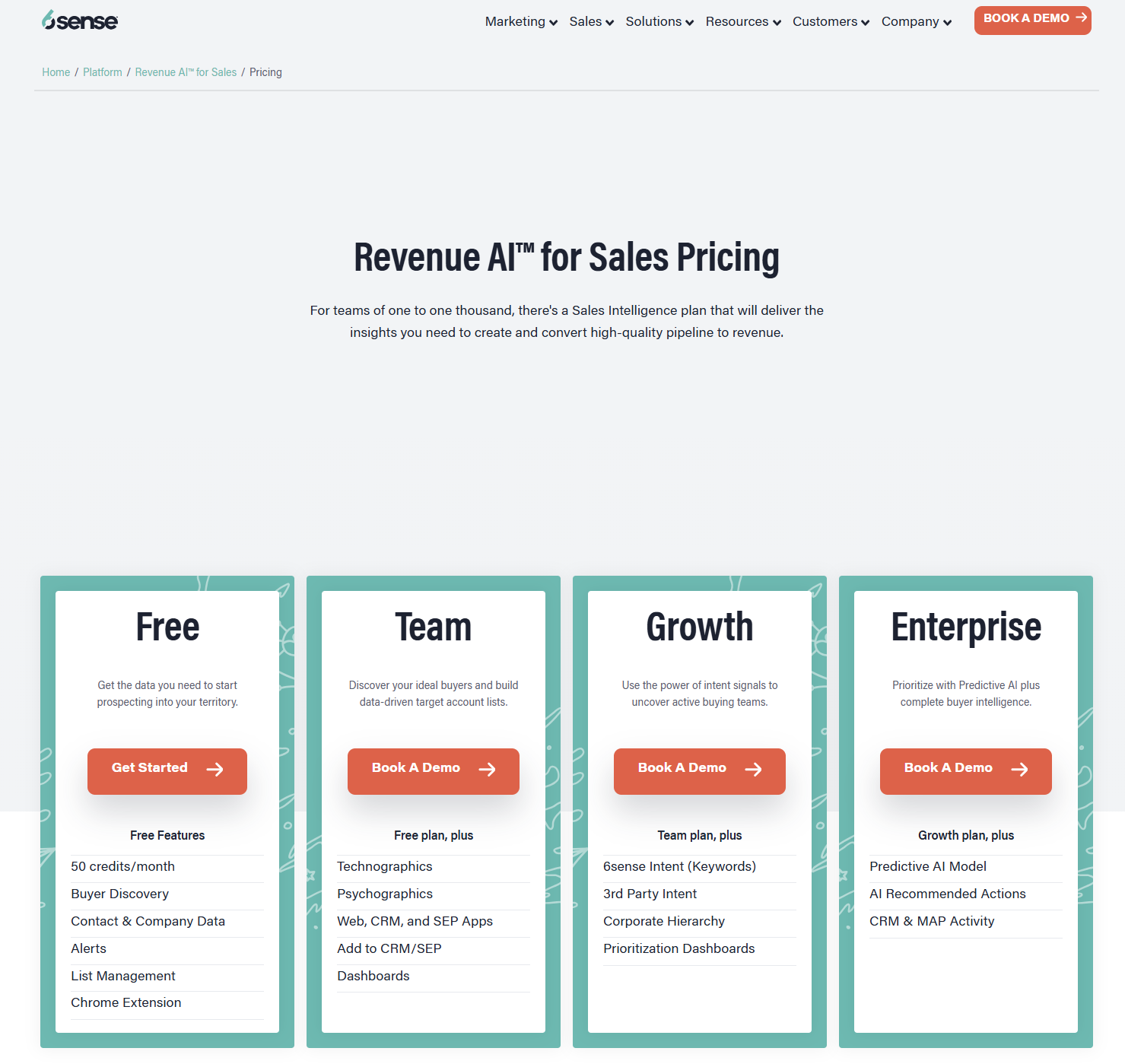
12. Hunter.io
Hunter.io is a specialized tool designed to help businesses find and verify professional email addresses, simplifying email outreach and getting higher deliverability.
Known for its user-friendly interface and reliable data, it’s an excellent choice for teams focused on precise and efficient outbound campaigns.
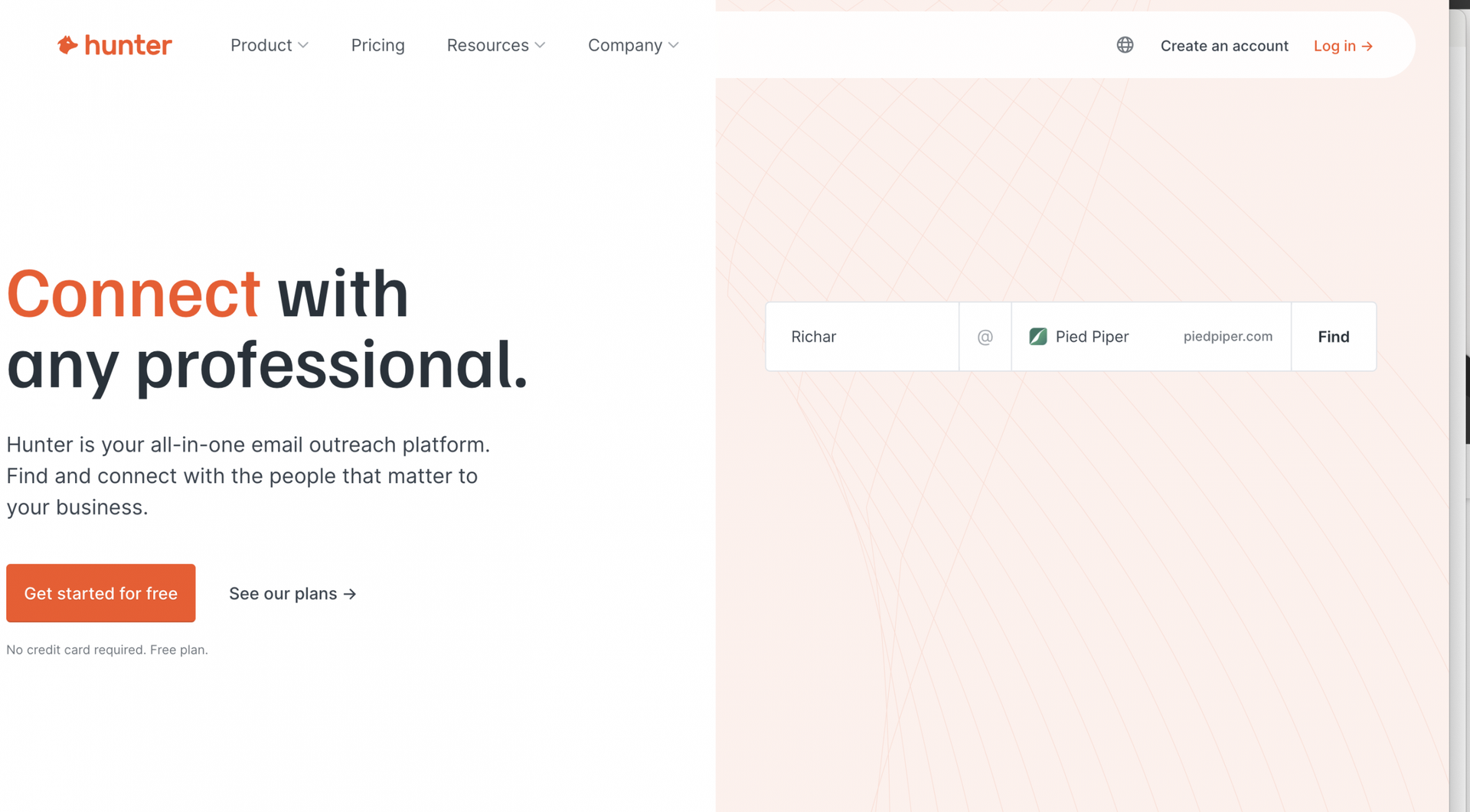
Key features
- Finds email addresses from domains or specific names with ease.
- Verifies email addresses to improve outreach success rates.
- Offers bulk email search and verification capabilities.
- Includes integrations with CRM tools like HubSpot and Salesforce.
- Provides a Chrome extension for quick email lookups.
Hunter.io vs. ZoomInfo
While both tools aid lead generation, their focus differs:
- Email precision: Hunter.io excels in email verification and finding contacts, making it perfect for outreach-focused teams.
- Comprehensive database: ZoomInfo offers a wider range of data, including company insights and intent signals, catering to larger enterprises.
- Ease of use: Hunter.io’s simple interface is easier for beginners, whereas ZoomInfo’s complexity may suit advanced users.
- Pricing flexibility: Hunter.io offers affordable plans for smaller teams, while ZoomInfo targets larger organizations with higher budgets.
Pricing
Hunter.io offers straightforward pricing, starting with a free plan (25 searches and 50 verifications/month).
Paid plans begin at $49/month for small teams and scale to $499/month for extensive needs, offering cost-effective options for businesses of all sizes.
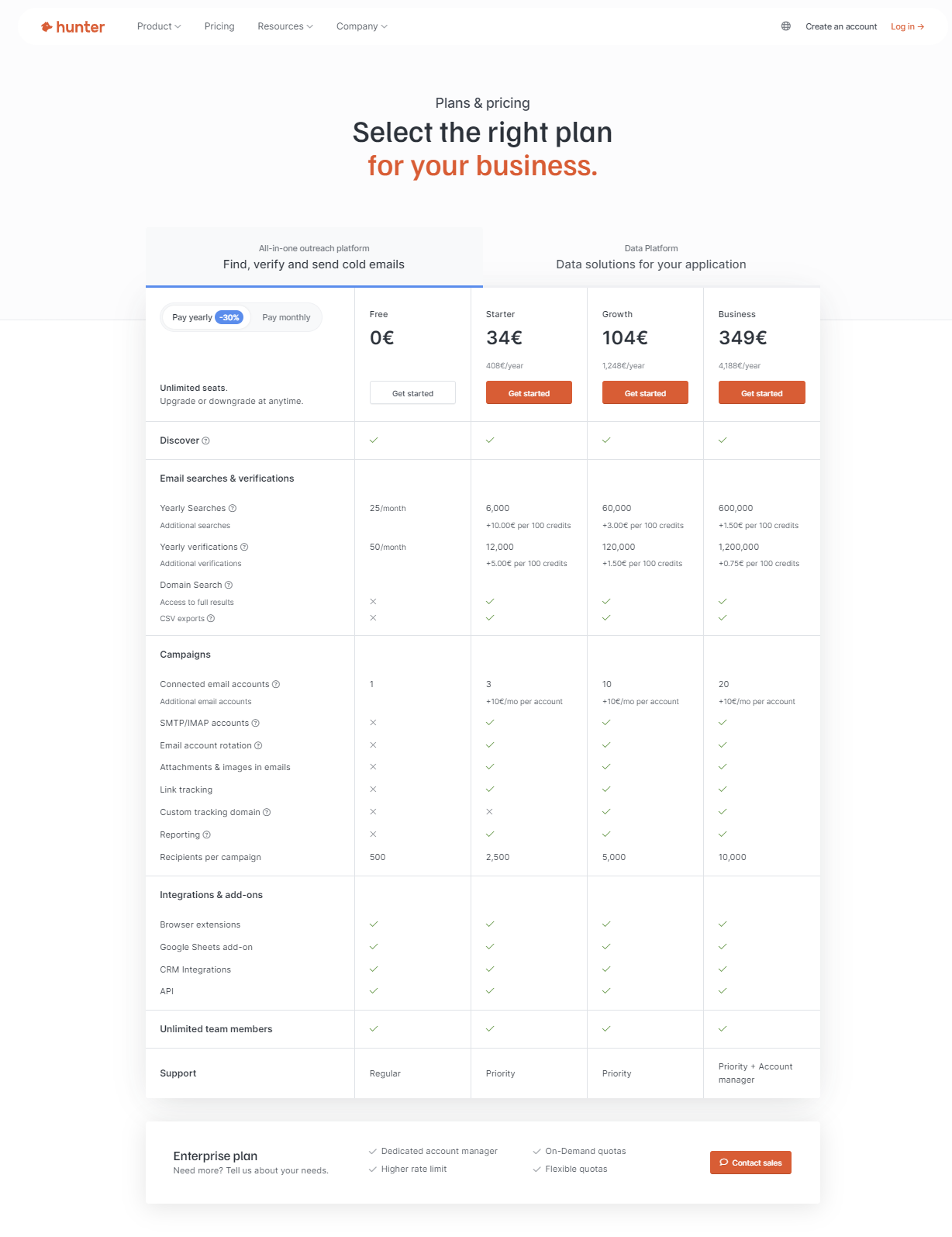
13. Apollo.io
Apollo.io is a sales intelligence and engagement platform that combines a vast B2B contact database with tools for automated outreach.
It’s a comprehensive solution for sales teams aiming to streamline their prospecting efforts.
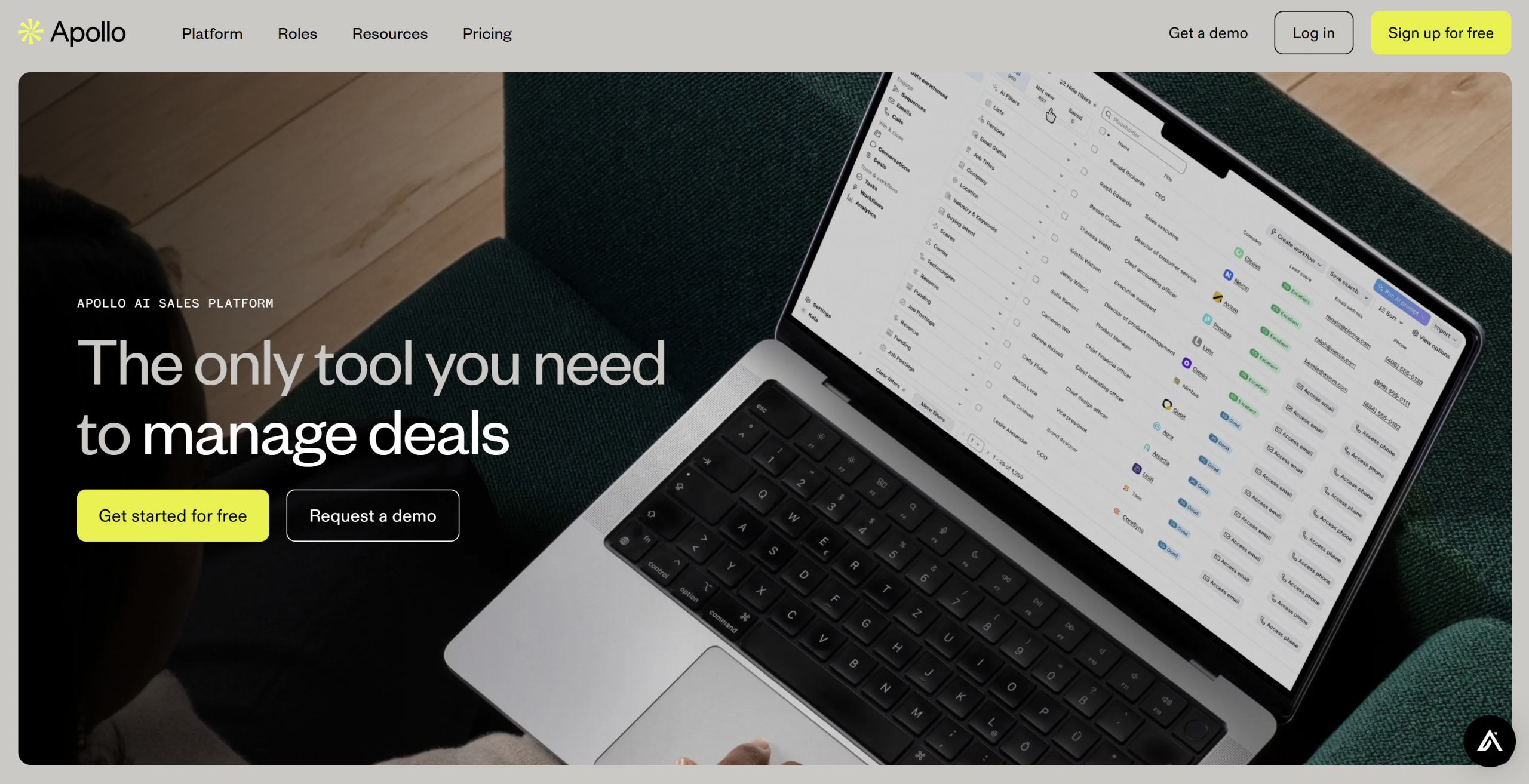
Key features
- Access to over 275 million contacts and 73 million companies.
- Sales professionals can create and manage personalized email campaigns for effective prospect engagement.
- The platform integrates seamlessly with CRMs like Salesforce and HubSpot.
- Advanced filters allow users to narrow down prospects by job title, industry, and company size.
Apollo.io vs. ZoomInfo
Here’s how Apollo.io compares to ZoomInfo:
- Data quality: Apollo.io offers a large database but may have less accurate email and phone information, whereas ZoomInfo provides more reliable contact details, especially in the U.S.
- Pricing: Apollo.io is more budget-friendly, with monthly plans starting at $59 per user.
- Engagement tools: Apollo.io includes built-in email sequencing and sales engagement features, whereas ZoomInfo focuses more on data provision without integrated outreach capabilities.
Pricing
Apollo.io offers a free plan with limited features, while paid plans start at $59 per user per month and provide access to its comprehensive contact database and sales engagement tools.
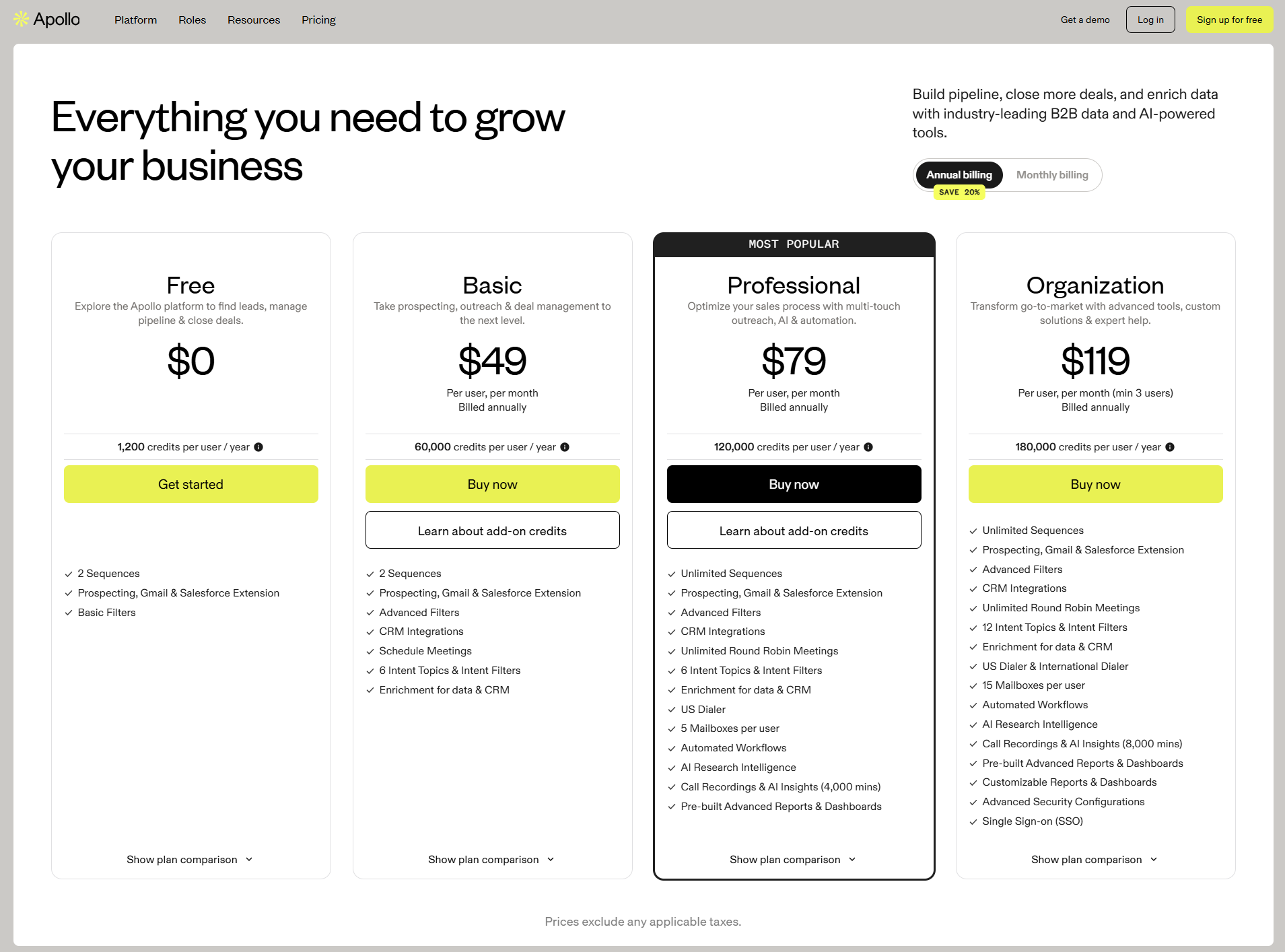
14. Seamless.ai
Seamless.ai simplifies lead generation by providing real-time verified data, empowering marketing and sales teams to identify prospects and drive engagement efficiently.
The tool offers a straightforward platform with AI-powered capabilities to improve outreach accuracy and effectiveness.
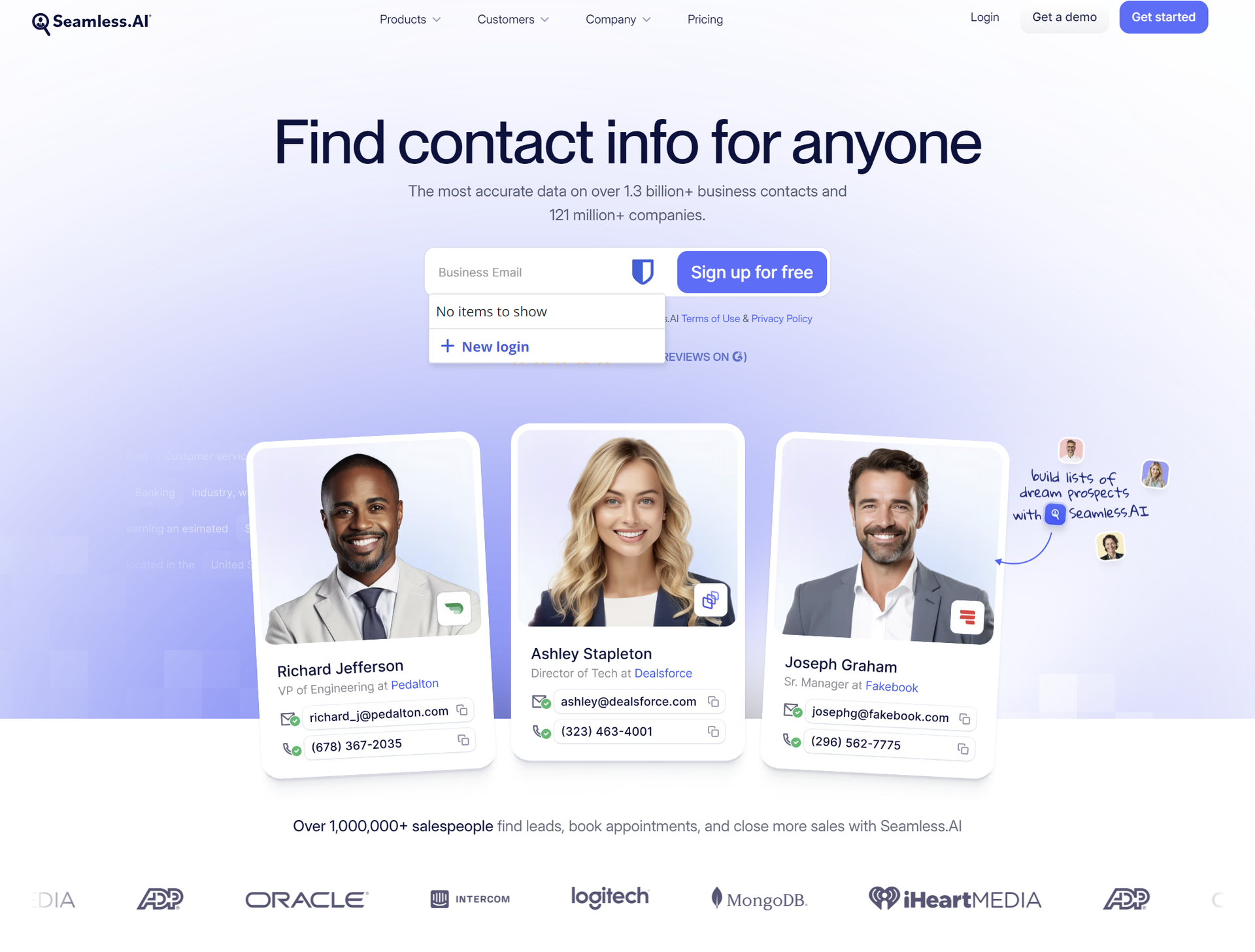
Key features
- Automatically builds lead lists tailored to ideal customer profiles.
- Verifies contact data in real-time to help with accurate outreach.
- Integrates smoothly with CRMs like Salesforce and HubSpot.
- Includes a Chrome extension for on-the-go contact detail retrieval.
Seamless.ai vs. ZoomInfo
Here are their main differences:
- Use case: Seamless.ai specializes in AI-powered lead generation and data verification, while ZoomInfo offers comprehensive contact profiles with advanced filtering options.
- Ease of use: Seamless.ai’s interface is easy to navigate, making it more beginner-friendly.
- Pricing: ZoomInfo’s pricing is higher, while Seamless.ai is budget-friendly.
Pricing
Seamless.ai offers a free plan with limited features and paid tiers starting at $147 per user per month.
Its flexible pricing and lower cost compared to ZoomInfo make it an attractive option for smaller teams or budget-conscious businesses.
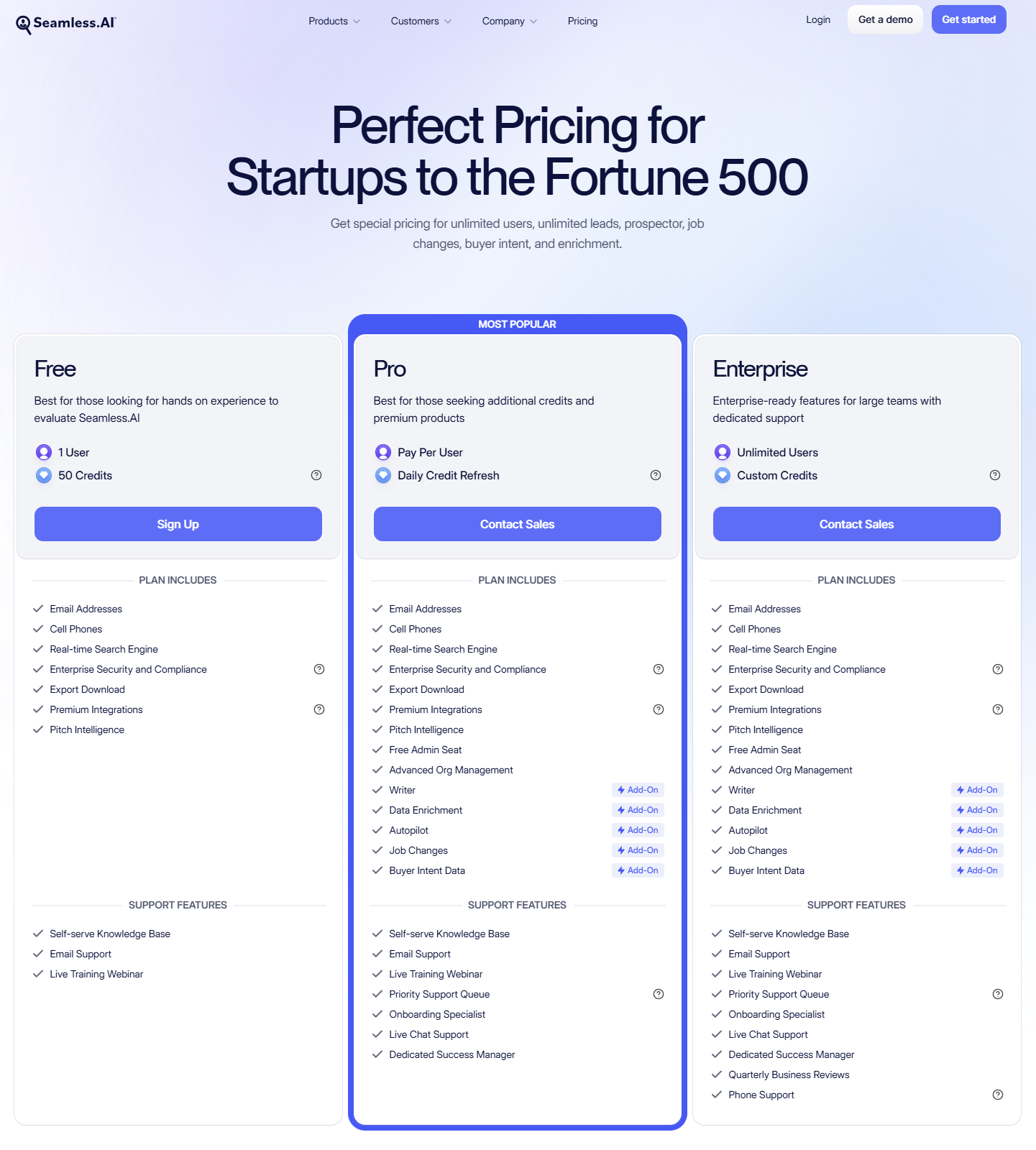
ZoomInfo competitors FAQ
What is ZoomInfo used for?
ZoomInfo is a sales intelligence tool that helps you find and connect with the right B2B prospects.
It has a huge database of verified contacts, buying signals, and company insights.
The platform makes prospecting easier by automating workflows and syncing with your CRM to ensure your data stays current.
How much does ZoomInfo cost?
ZoomInfo starts at $14,995 per year, with a two-year minimum contract. Pricing depends on the features you need, such as intent data or advanced integrations.
It’s an investment mainly designed for larger teams that need detailed data and robust tools to scale their outreach.
Why should you look for an alternative to ZoomInfo?
ZoomInfo has a strong reputation, but it’s not perfect for everyone. Here’s why you might want to consider other options:
- Frequent performance hiccups: System crashes and technical glitches can slow you down.
- Opaque pricing: The lack of transparent pricing makes it hard to know if it fits your budget well.
- Costly plans: It’s one of the pricier options, which might not be ideal for smaller teams or businesses.
- Data accuracy concerns: Some users have flagged outdated or incomplete data, which isn’t great when your outreach depends on reliable information.
If any of these sound familiar, exploring alternatives could give you more value and fewer headaches.
How to choose the best ZoomInfo competitor for sales and marketing teams?
Picking the right alternative to ZoomInfo depends on what matters most to your team.
Here are a few things to weigh before making a decision:
- Data quality and accuracy: Reliable, up-to-date, and accurate data is the backbone of effective outreach.
- Features that fit your workflow: Consider what your team actually needs—do you need CRM integrations, intent data, or automation tools?
- Budget alignment: Some tools offer great features at a fraction of ZoomInfo’s cost, so prioritize value for money.
- Scalability: Choose a platform that can grow with your team’s needs.
- Ease of use: A user-friendly tool will save time and help your team hit the ground running.
Ultimately, it’s about finding the tool that best suits your team’s goals and day-to-day operations.
